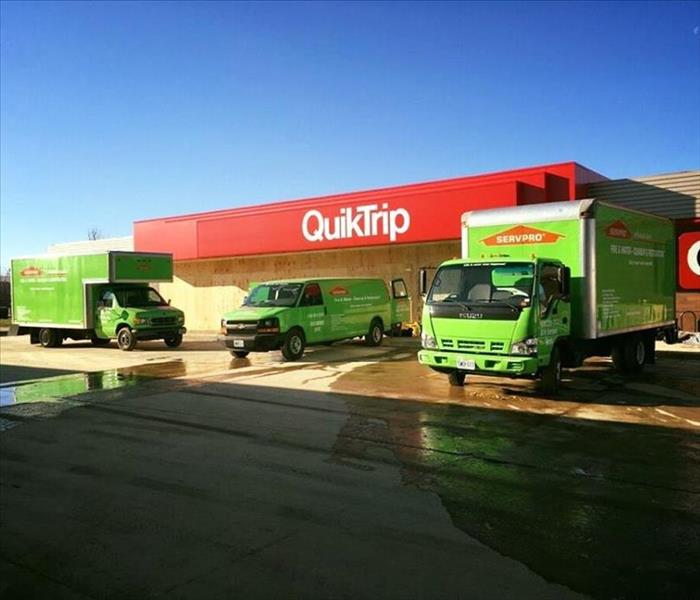Recent Community Posts
September is National Preparedness Month
8/19/2021 (Permalink)
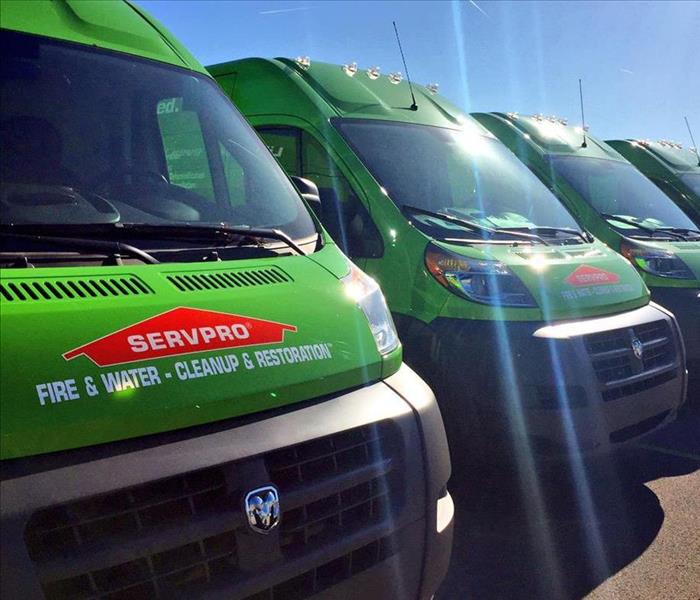 An easy way to prepare this September is by having a free SERVPRO ERP assessment.
An easy way to prepare this September is by having a free SERVPRO ERP assessment.
Did you know that September is National Preparedness Month? National Preparedness Month is an observance each September to raise awareness about the importance of preparing for disasters and emergencies that could happen at any time. The 2021 theme is “Prepare to Protect. Preparing for disasters is protecting everyone you love.”
Here are some ways you can prepare this September:
Make A Plan
Talk to your friends and family about how you will communicate before, during, and after a disaster. Make sure to update your plan based on the Centers for Disease Control recommendations due to the coronavirus.
Build A Kit
Gather supplies that will last for several days after a disaster for everyone living in your home. Don’t forget to consider the unique needs each person or pet may have in case you have to evacuate quickly. Update your kits and supplies based on recommendations by the Centers for Disease Control.
No-Cost Preparedness
Limit the impacts that disasters have on you and your family. Know the risk of disasters in your area. Learn how to make your home stronger in the face of storms and other common hazards. Check your insurance coverage to make sure it is up-to-date.
Teach Youth About Preparedness
Talk to your kids about preparing for emergencies and what to do in case you are separated. Reassure them by providing information about how they can get involved.
The SERVPRO Emergency READY Profile Advantage
Another way to prepare your business to be ready for whatever happens is to schedule a SERVPRO Emergency Ready Profile. By developing a SERVPRO Emergency READY Profile for your business, you minimize business interruption by having an immediate plan of action. Knowing what to do and what to expect in advance is the key to timely mitigation and can help minimize how water and fire damage can affect your business. The SERVPRO ERP is a no cost assessment of your facility, even if you have multiple locations. To learn more, visit ready.SERVPRO.com or call SERVPRO of Franklin County at 636-583-5200 today.
Firework Celebration Safety
6/25/2021 (Permalink)
 Stay safe during your Fourth of July celebration.
Stay safe during your Fourth of July celebration.
The fourth of July would not be complete without fireworks. However, the thrill of fireworks can also bring injuries.
According to cpsc.gov you can firework injuries by following these safety tips:
- Never allow young children to play with or ignite fireworks.
- Avoid buying fireworks that are packaged in brown paper because this is often a sign that the fireworks were made for professional displays and that they could pose a danger to consumers.
- Always have an adult supervise fireworks activities. Parents don't realize that young children suffer injuries from sparklers. Sparklers burn at temperatures of about 2,000 degrees - hot enough to melt some metals.
- Never place any part of your body directly over a fireworks device when lighting the fuse. Back up to a safe distance immediately after lighting fireworks.
- Never try to re-light or pick up fireworks that have not ignited fully.
- Never point or throw fireworks at another person.
- Keep a bucket of water or a garden hose handy in case of fire or other mishap.
- Light fireworks one at a time, then move back quickly.
- Never carry fireworks in a pocket or shoot them off in metal or glass containers.
- After fireworks complete their burning, douse the spent device with plenty of water from a bucket or hose before discarding it to prevent a trash fire.
- Make sure fireworks are legal in your area before buying or using them.
We hope that you stay safe over the holiday! If disaster does strike, give SERVPRO of Franklin County a call. We are “Here to Help” 24/7: 636-583-5200.
You can be ruined, or you can be READY.
4/6/2021 (Permalink)
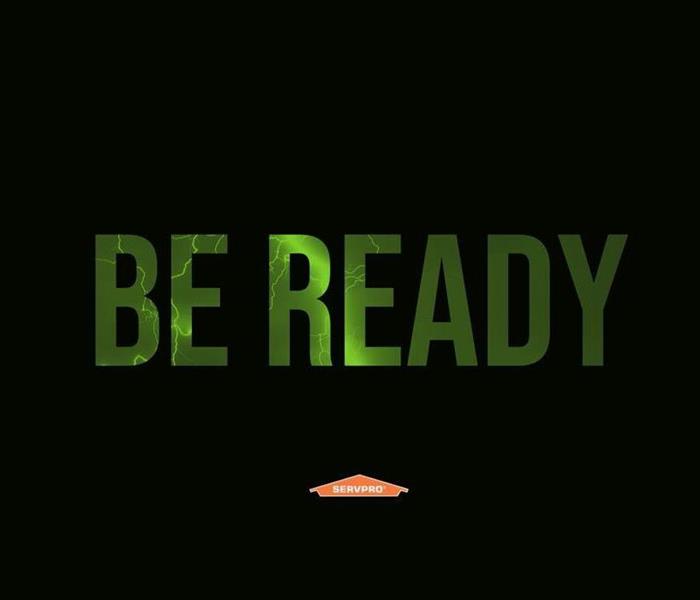 Are you READY? Use technology to store your important information.
Are you READY? Use technology to store your important information.
Technology can now be a vital tool in preparing for emergencies or disasters, as well as during or after to stay informed of the situation and in communication with others. From common technology you already use on a day-to-day basis to taking a few extra steps to prepare, the following can help you be ready in the event of an emergency or disaster.
Store Information Online
There are many places to store important information securely online. Services like Google Drive and Dropbox offer free way to store different types of files, from a Word document to images of important documents. Ready.gov suggests saving an electronic version of insurance policies, identification documents, medical records, and information on your pets, if necessary.
Follow the News
Stay informed by following agencies such as FEMA, local news channels, and local government on Twitter for the most up-to-date information in a disaster situation. You can also alert first responders if a rescue is needed through Twitter.
Mark Yourself Safe
The American Red Cross offers a Safe & Well check-in site to list yourself as safe or find family and friends in situations where
communication is difficult to establish. Facebook also has a feature called Safety Check that is activated after natural disasters or a crisis. You will receive a notification from Facebook if you’re located in the affected area at that time.
Get in Touch
Make sure your contact information is up to date in your phone and e-mail for communication with family, friends, business contacts, and others whom you may need to get in contact with before, during, or after a disaster.
Charge Up
Keep a portable charger in your car and home in case of an emergency. You may need to recharge this from time to time, but you can also buy solar-powered chargers as well.
Get an Emergency READY Profile®
SERVPRO® is proud to offer Emergency READY Profiles® (ERP) for free at ready.SERVPRO.com to help prepare you, your property, or your business for an emergency. By developing a SERVPRO® Emergency READY Profile® for your property or business, you minimize business interruption by having an immediate plan of action. Knowing what to do and what to expect in advance is the key to timely mitigation and can help minimize how water and fire damage can affect your property or business. Put help in the palm of your hand with the Ready Plan App.
What to Watch For When the Weather Thaws
3/8/2021 (Permalink)
Everyone loves when the weather warms up following frigid temperatures, but it’s not always sunshine and rainbows.
During a thawing, many problems can arise in your home and property. Here are some things to look out for during a winter thaw.
You won’t have to look hard for this one. When the weather warms, frozen pipes can be liable to burst. This is because ice has more volume than water, so when water freezes inside a pipe, it expands and bursts out of the pipe.
If you do have a pipe burst, first and foremost it’s imperative to shut off the water supply. Your next step should be to call professionals. The professionals at SERVPRO can help mitigate any water damage that might have occurred, and a plumber will be necessary to fix the burst pipes.
During the winter, your gutters might have accumulated debris, which could cause water to flow past the drain spouts and into the side of your home. Clear your gutters so that water can properly drain through your drainpipes and away from your home.
If you notice water that has gotten into your home (particularly the basement), it needs to be addressed immediately. If you want to go the DIY route, a sump pump can be used to pump out the water. The professionals at SERVPRO can also be brought in to help deal with water damage.
While driving on frozen, snowy roads can be dangerous, it can also be dangerous after it melts. Be on the lookout for slush or water on the roads. Water can cause roads to be slippery, and slush can also create dangerous conditions by impacting braking and changing lanes, while also potentially obscuring your vision while you’re driving
Maintenance on your vehicle might also be necessary. It’s recommended that windshield wipers be changed every six months, so it might be to switch them out. Also, snow and salty roads can cause corrosion for your car, so get it washed.
Be sure to check your brakes, tires and fluids while you’re at it. Your brakes and tires might have been damaged by driving on roads with poor conditions, and fluid levels could be low after the winter.
A mid-winter thaw can be dangerous for plants and gardens, as they can begin sprouting too early. While there’s not a lot you can do to prevent this, you can protect especially fragile plants by covering them with snow or mulch. Also, you can protect your plants and garden by avoiding walking over them as much as possible. Wearing snowshoes in the winter can spread your weight out and prevent damage.
How to Deal With Extreme Cold
2/16/2021 (Permalink)
 Extreme cold? Use these tips to stay safe.
Extreme cold? Use these tips to stay safe.
With our area experiencing extreme cold with temperatures near zero degrees, it’s vital to protect yourself from frigid weather.
While most of us try to stay inside as often as possible when there’s below-freezing temperatures, there are times where we’re forced to go outside. If you do find yourself having to go outside into freezing temperatures, follow these steps in order to stay warm.
Dressing appropriately during extreme cold is the most important step you can take. Wearing loose layers of clothing is smart because what keeps you warm is the insulated air that circulates between each layer. Avoid tight clothing, as it reduces blood circulation and cuts off flow to the extremities.
- Protect Ears, Face, Hands and Feet
These are the most important parts of the body to cover, as they are often the most exposed. Hats, gloves, snow boots, extra pairs of socks, and ski masks/face coverings are all vital.
Body circulation is the key to warmth. You can wear plenty of layers, but if you’re not moving then you will still be cold. Stay in constant motion to keep your blood pumping.
- Drink Warm Fluids and Eat
Soup, coffee, hot tea, hot chocolate are great choices on cold days. Eating extra healthy fats during the winter can increase metabolism, which in turn heats the body, according to Columbia Health.
Freezing temperatures can cause dangerous road conditions. If you have to drive somewhere, be sure to check the local news or MoDOT’s website before you go out.
- Be Aware of Signs of Hypothermia
Prolonged exposure to the cold can result in hypothermia, or abnormally low body temperature. Hypothermia can occur when your body temperature falls below 95 degrees Fahrenheit, so it’s important to monitor yourself and be aware when your body is cold. Check the CDC's guide for recognizing hypothermia to help understand if you or someone else is experiencing this affliction.
What to Put In Your Car Emergency Kit
1/24/2021 (Permalink)
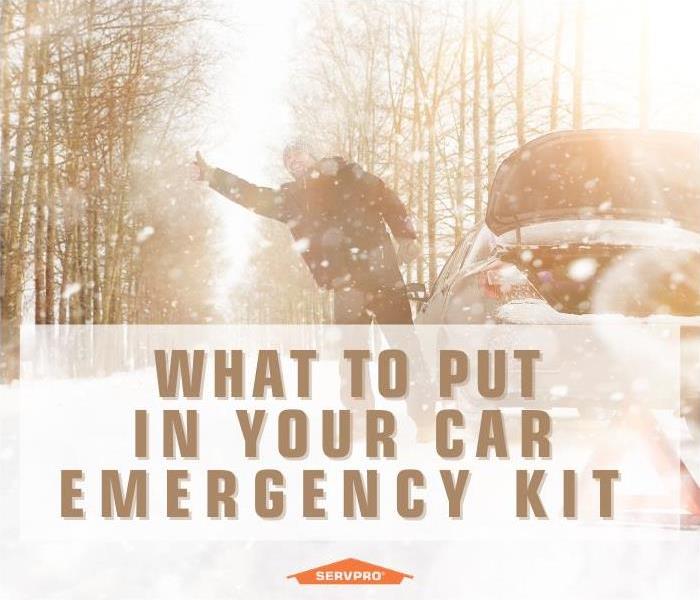 Keeping an emergency kit in your car is a good way to be ready for whatever happens, especially during the cold snowy months.
Keeping an emergency kit in your car is a good way to be ready for whatever happens, especially during the cold snowy months.
You never want to be in a situation where you’re stranded without any supplies. That’s why it’s important to always have an emergency kit in your vehicle.
Emergency kits should contain a wide variety of materials. While it’s important to customize your kit for your personal needs, here are some of the items we recommend for you to carry.
If you get a flat tire, you will obviously need a new one to replace it with. Include a jack in the kit so that you can change out the tire.
If you’re stranded somewhere and your car dies, jumper cables are essential to get your vehicle up and running again.
If you or one of your passengers is injured, having a first aid kit handy is critical. Some recommended items to keep in your first aid kit are gauze, bandages, antibiotic ointment, tape, bandages, scissors, aspirin and hydrocortisone. Fill your first aid kit to fit your specific needs.
- Car Escape Tools
Getting trapped in a vehicle is a nightmare scenario, so that’s why you need to have tools that will help get you or your passengers out of that situation. Seatbelt cutters window breakers are cheap and can potentially be life-saving.
- Non-Perishable Food
If you’re going to be stuck for an extended period of time, it’s important to have some food on hand. Snacks like unsalted nuts, dried fruit and hard candy are ideal choices to keep in your car.
- Drinking Water
Hydration is also critical. Keeping some bottled water in your car could pay off when you need it.
- Winter Weather Items
When you’re dealing with extreme winter conditions, you’ll want your emergency kit to be filled with items that will help deal with the climate. Some items to keep on hand are blankets, warm clothing, a snow brush, shovel and windshield washer fluid.
- Flashlight
Most of us rely on the flashlight on our phones, but what would you do if your phone died? A handheld flashlight could prove to be a vital piece of equipment in your emergency kit.
The Dangers of Carbon Monoxide
1/19/2021 (Permalink)
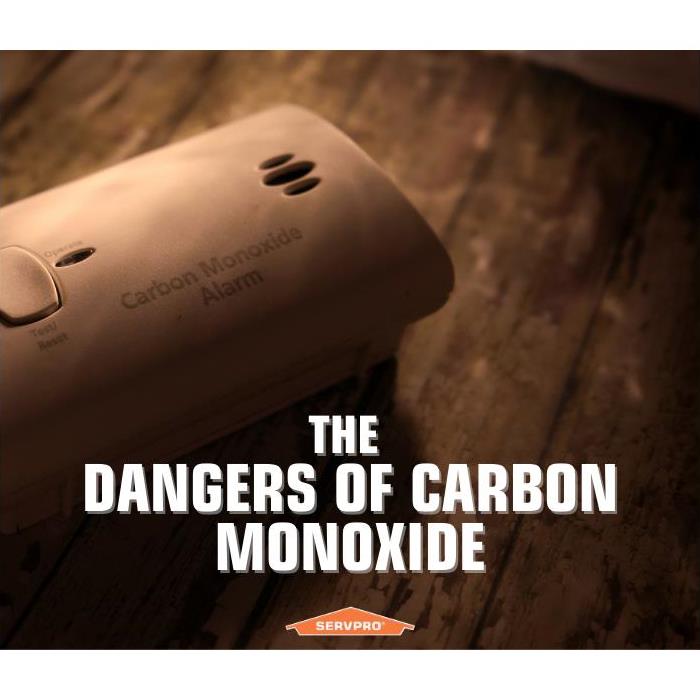 While carbon monoxide poisoning is a scary thought, it is entirely preventable.
While carbon monoxide poisoning is a scary thought, it is entirely preventable.
When the temperature drops in the winter, your furnace has the potential to become a silent killer.
Oil and gas burning furnaces produce carbon monoxide (CO). CO is an odorless, invisible, poisonous gas that kills at least 430 people each year and sends approximately 50,000 to the hospital.
Breathing in carbon monoxide fumes prevents the body from using oxygen properly, which can damage the brain, heart and other organs. Breathing in carbon monoxide can lead to a variety of symptoms, such as headaches, dizziness, nausea, vomiting and shortness of breath.
People with pre-existing health issues are at greater risk to harm from CO. Children, pregnant women and older adults are also at greater risk.
Where Does Carbon Monoxide Come From?
The most common source of CO poisoning is unvented space heaters in the home. Instead of venting the gases outdoors, they are vented into the room. A space heater that is not installed properly or isn’t working correctly can release CO and use up much of the oxygen in the room.
Space heaters aren’t the only sources of carbon monoxide, however. Other common sources of carbon monoxide include:
- Malfunctioning cooking appliances
- Clogged chimney
- Malfunctioning water heater
- Malfunctioning oil, wood, gas, or coal furnaces
- Malfunctioning gas clothes dryer
- Wood burning fireplace, gas log burner, or any unvented space heater
- Gas or fuel-burning appliances in cabins or campers, barbecue grills, pool or spa heaters, or ceiling-mounted heating units
- Fires
How Can Carbon Monoxide Poisoning Be Prevented?
While carbon monoxide poisoning is a scary thought, it is entirely preventable.
First, you should have your furnace and fireplace inspected before each winter. CO detectors should be installed in your home, and the batteries should be checked and replaced regularly.
Only use fuel-burning space heaters in well-ventilated areas. If possible, use electrical space heaters, as they don’t pose any danger of CO poisoning. When using a gas-powered generator for electricity, be sure to keep it a safe distance away from the home.
When it comes to heating your home, it’s vital to be aware of the risks of carbon monoxide. Neglecting your heating system can lead to heartbreak and tragedy for your family. Maintaining your heating system will ensure your family’s safety.
SERVPRO Donates Vehicle Cleanings to First Responders
12/26/2020 (Permalink)
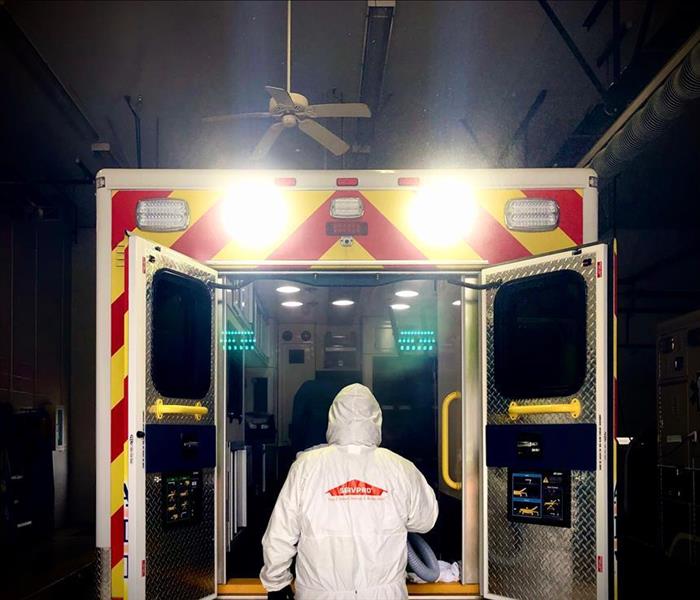 SERVPRO of Franklin County is proud to be assisting local first responders stay safe during the pandemic by offering free disinfectant cleanings.
SERVPRO of Franklin County is proud to be assisting local first responders stay safe during the pandemic by offering free disinfectant cleanings.
When COVID-19 struck our world, we at SERVPRO of Franklin County set out to do our parts in helping combat the virus.
That’s why we decided to sanitize each Franklin County first responder department’s vehicles free of charge.
“We wanted to help keep our first responders safe from COVID,” said SERVPRO of Franklin County owner Jerry Alvey. “We know how important it is to keep them healthy, because they’re the ones who keep us safe and healthy. They do so much for all of us, so we decided to lend them a helping hand.”
Since COVID-19 took off in the U.S. in March, SERVPRO has cleaned 303 police vehicles, 220 fire trucks and 161 ambulances. In total, we have cleaned 582 First Responder vehicles in Franklin County.
“We are very proud of our efforts to make a positive impact on our first responders,” Alvey said. “We felt like it’s the least we could do after all they do for us.”
We have also helped countless businesses disinfect their workplaces when they’ve had contact with COVID.
SERVPRO of Franklin County is honored to have contributed to helping our area stay safe during this difficult year. We will continue to do our part to ensure safe environments for homes, businesses and first responders.
VirUS
8/1/2020 (Permalink)
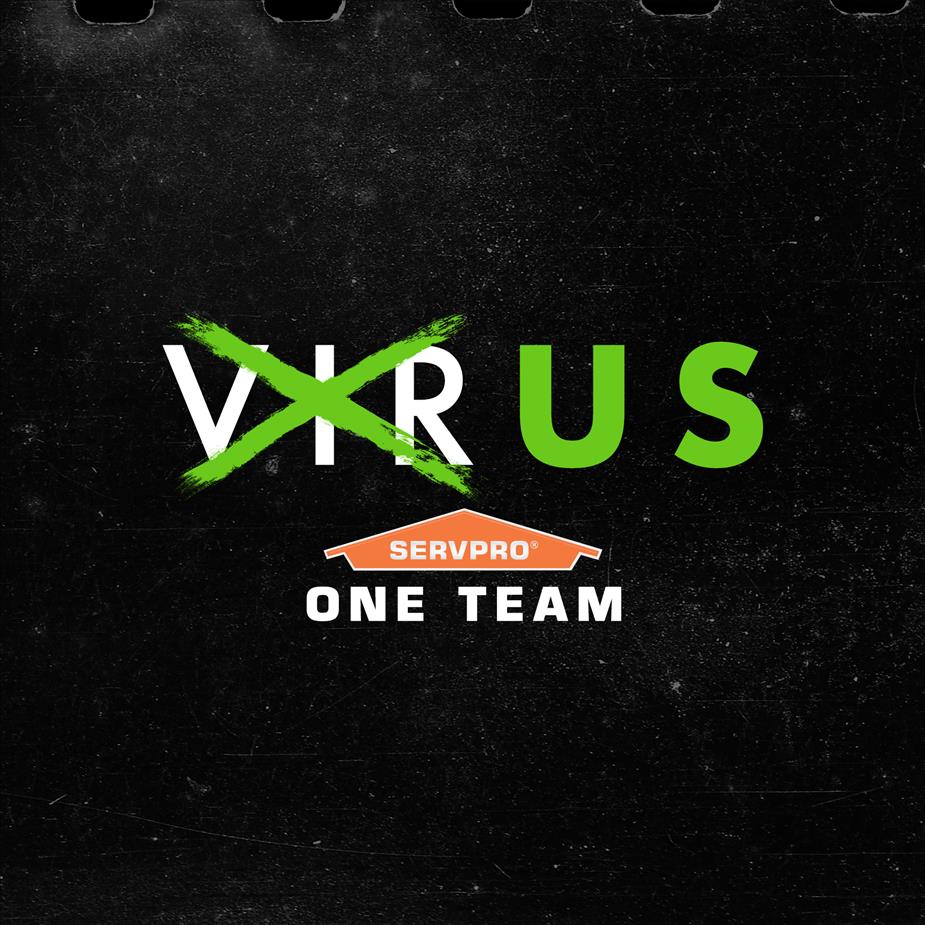 One Team. We are here in the community and ready to serve.
One Team. We are here in the community and ready to serve.
We are all in this together.
While the many of our community went into quarantine, we went into action, disinfecting area first responders’ vehicles and area businesses – completely for free.
As Missouri started to reopen, we began to offer our Certified: SERVPRO Cleaned program. This is a proactive cleaning that works in addition to the already great lengths our community takes to keep everyone safe.
Now, the pandemic continues and so do we. COVID-19 cases are on the rise and we have been busy working to keep the community safe. We have completed numerous confirmed COVID-19 disinfectant cleanings at area businesses.
As of today, we have cleaned 276 police cars, 189 fire trucks, and 117 ambulances. We have also completed free disinfecting at several local restaurants, insurance agents, and other small business we’ve known throughout the years – no charge.
We do not know what this new normal will bring in the future, but we know one thing: we will be READY to help when you need us.
In the event of a suspected or confirmed COVID-19 event, we will be there cleaning within 24 hours to ensure you get back to business as quickly as possible.
We are here and ready to serve.
Call us 24/7: 636-583-5200
CPR and First Aid Certified
7/10/2020 (Permalink)
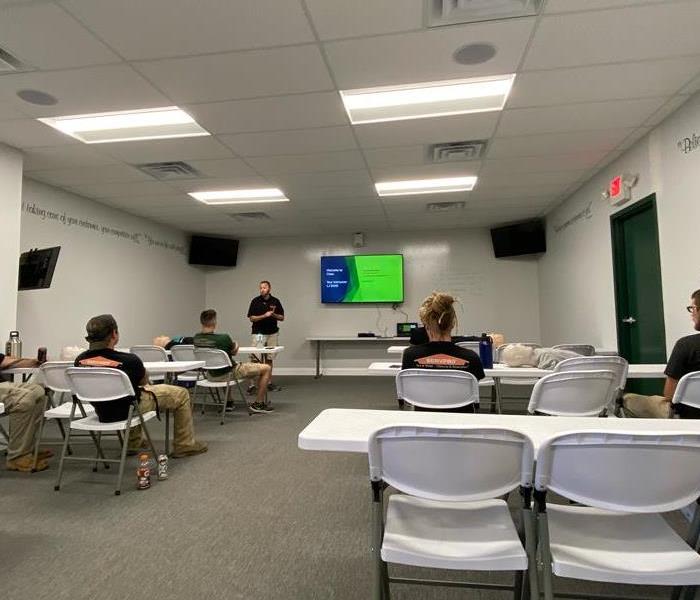 Learning CPR and first aid. A big thank you to Stayin' Alive.
Learning CPR and first aid. A big thank you to Stayin' Alive.
A huge thank you to Stayin’ Alive for coming by today to train all our employees on CPR and first aid. While not an event that would typically be in our daily duties, our employees are on the road and visiting customers every day. This was an excellent training for us to know what to do if a fellow employee or customer became injured or ill. We hope that everyone stays safe, but if needed we could use this valuable information in the future.
Protect Yourself & Others During the Pandemic
4/22/2020 (Permalink)
Everyone Should
Clean your hands often
- Wash your hands often with soap and water for at least 20 seconds especially after you have been in a public place, or after blowing your nose, coughing, or sneezing.
- If soap and water are not readily available, use a hand sanitizer that contains at least 60% alcohol. Cover all surfaces of your hands and rub them together until they feel dry.
- Avoid touching your eyes, nose, and mouth with unwashed hands.
Avoid close contact
- Avoid close contact with people who are sick
- Put distance between yourself and other people.
- Remember that some people without symptoms may be able to spread virus.
- Keeping distance from others is especially important for people who are at higher risk of getting very sick.
Cover your mouth and nose with a cloth face cover when around others
- You could spread COVID-19 to others even if you do not feel sick.
- Everyone should wear a cloth face cover when they have to go out in public, for example to the grocery store or to pick up other necessities.
- Cloth face coverings should not be placed on young children under age 2, anyone who has trouble breathing, or is unconscious, incapacitated or otherwise unable to remove the mask without assistance.
- The cloth face cover is meant to protect other people in case you are infected.
- Do NOT use a facemask meant for a healthcare worker.
- Continue to keep about 6 feet between yourself and others. The cloth face cover is not a substitute for social distancing.
Cover coughs and sneezes
- If you are in a private setting and do not have on your cloth face covering, remember to always cover your mouth and nose with a tissue when you cough or sneeze or use the inside of your elbow.
- Throw used tissues in the trash.
- Immediately wash your hands with soap and water for at least 20 seconds. If soap and water are not readily available, clean your hands with a hand sanitizer that contains at least 60% alcohol.
Clean and disinfect
- Clean AND disinfect frequently touched surfaces daily. This includes tables, doorknobs, light switches, countertops, handles, desks, phones, keyboards, toilets, faucets, and sinks.
- If surfaces are dirty, clean them. Use detergent or soap and water prior to disinfection.
- Then, use a household disinfectant. Most common EPA-registered household disinfectant will work.
Here to Help Our First Responders
4/5/2020 (Permalink)
 SERVPRO Technician disinfecting Union, MO police department vehicles
SERVPRO Technician disinfecting Union, MO police department vehicles
SERVPRO of Franklin County recently reached out to our local first responders, including local police, fire department and ambulance districts in order to disinfect their vehicles for free.
This is our way of helping protect our first responders from the COVID-19 pandemic. While this is just a small way to pay back our responders for their hard work and dedication, we hope that this will give them some peace of mind knowing their vehicles were properly disinfected.
We recently finished completing cleaning for the Union, MO police and the Pacific, MO fire department and have more disinfectant appointments for other area first responders scheduled in the future. If any first responders would like to request information about this service, please give us a call.
If you have questions regarding disinfecting your home or business, we are here to help.
Give SERVPRO of Franklin County a call, 24/7: (636) 583-5200
Viruses in Everyday Life
3/23/2020 (Permalink)
This time of year can be draining because of all the colds and sickness going around. It’s hard enough with the common cold, but add in the flu, RSV, and all the new strains of things…. It’s enough to make you want to stay indoors and away from the public!
It’s obviously very difficult to completely isolate ourselves. We do have lives after all! We go to work, to the grocery store, out to eat, to the bank, and maybe even have kiddos who attend school - which is just teeming with germs!
So, what exactly is a virus? That’s a long answer! The short answer: They’re like a parasite and can only survive long-term within a host. Viruses attach themselves to their host’s cells and begin replicating, and then (depending on the virus) the infection begins.
Viruses are spread through droplets from a cough, sneeze, or saliva of an infected person getting into another person’s mouth or being inhaled; and by touching a surface that has been exposed to the virus. Sometimes a person can be infected for a period before any symptoms arise (days even), making the chances of spreading the virus even more likely. As for surface areas, they can survive from a few hours up to a few weeks, depending on the virus. Yes, WEEKS!
Sounds awful right? Gives me shivers thinking about it! The key here is that viruses can only replicate within a host! Therefore, hand washing is a big deal and one of the biggest ways to help yourself avoid them. That’s only part of the picture though.
Imagine you’re going out for dinner. You take the precaution of thoroughly washing your hands. However, did you touch the door handle to enter/exit? Did you just spend several minutes flipping through the menu that countless others have touched that day? Still hungry?
Schools are even worse because you’re relying on young children to wash their hands properly, otherwise they’re easily spreading those germs as they walk down the hallways, trailing their hands along the wall after sneezing or coughing directly into them.
The point is YOU can wash your hands as often as you’d like (honestly any little bit helps), but our community and businesses also need to do their part and make a conscious effort in battling these nasty viruses. If we can decrease the surface contamination, cover noses and mouths when coughing or sneezing, and wash our hands regularly it will significantly decrease the chances of these viruses entering our bodies and causing more infections.
We hope that with how hard viral infections have been so far this year and this season, that businesses will increase their cleaning efforts.
We can help minimize the spread of germs with proactive cleaning! At SERVPRO, we’re trained to adhere to the highest cleaning and sanitization standards, making us the #1 choice for cleanup and restoration. Call 636-583-5200 to see how we can help clean your home or business.
Sources:
https://www.cdc.gov/flu/about/disease/spread.htm
https://www.sciencefocus.com/the-human-body/how-long-can-a-virus-live-outside-a-body/
The Power of Hand-Washing
3/9/2020 (Permalink)
While everyone may be focused on the new COVID-19, reports of the flu and strep are running rampant as well. It is a good time to review the ways to keep yourself and your family safe. What’s the biggest step you can take? Hand washing!
Believe it or not, many people do not know the proper way to wash their hands! A quick dap of soap and a rinse will not protect you from germs. Hand sanitizer will help when you need a quick way to sanitize your hands – just make sure it has more than 60% alcohol.
Coronaviruses are encased in a lipid envelope -- basically, a layer of fat. Soap can break that fat apart and make the virus unable to infect you. The second thing soap does is mechanical. It makes skin slippery so that with enough rubbing, we can pry germs off and rinse them away.
Recent studies report that the temperature of the water doesn’t matter – but scrubbing your hands for 20 seconds does. Most people only wash their hands for about 6 seconds, states the study.
Be sure to wash your hands OFTEN, especially after using the bathroom and before you eat. Be sure to avoid touching contaminated surfaces. Use a clean paper towel to open bathroom doors. Disinfect dirty surfaces that you use every day, like the touchscreen on your phone and your computer keyboard.
Source: https://www.webmd.com/lung/news/20200306/power-of-hand-washing-to-prevent-coronavirus
Winter Car Preparedness
1/31/2019 (Permalink)
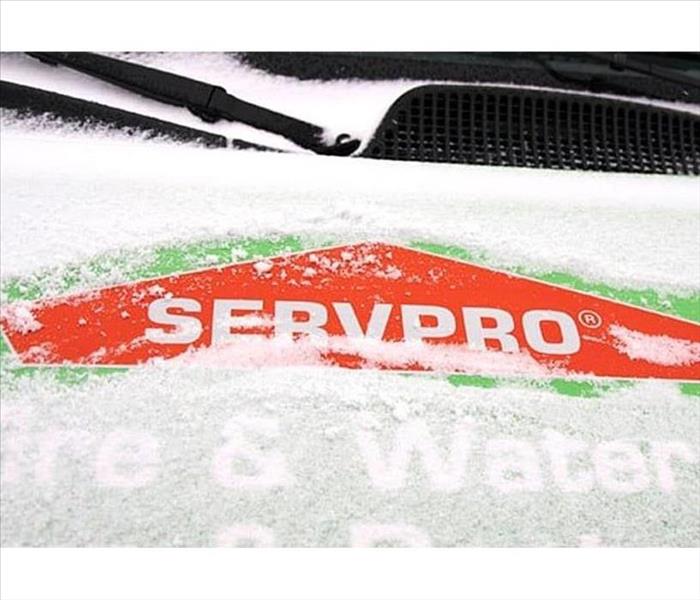 Winter Preparedness
Winter Preparedness
Car Winter Safety
Winter isn't over yet!
Have you made a winter preparedness kit for your car?
You may have a few things.. but what if you were stranded overnight in your car?
It happened just a few weeks ago....
Thousands of motorists were stranded over night on I-44 and other highways.
Can you imagine being stuck on the road for that long?
It's a good reason to add a few things to your trunk.
So... What should you keep in your car?
While many things are a duplicate of a general emergency kit, here's a list to check before heading out:
- Water
- Food
- Flashlights
- First aid kit
- Whistle to signal for help
- Moist towelettes, garbage bags and plastic ties for personal sanitation
- Cell phone with chargers
- Blankets and extra winter gear (gloves and hats)
If you have kids, you may also want to include books, games, puzzles or other activities.
If you know there will be winter weather headed your way, fill up your gas task before heading out.
Have a mechanic check the following on your vehicle prior to an emergency:
- Antifreeze levels
- Battery and ignition system
- Brakes
- Exhaust system
- Fuel and air filters
- Heater and defroster
- Lights and flashing hazard lights
- Oil
- Thermostat
- Windshield wiper equipment and washer fluid level
Frozen Pipes? Yes, we're still talking about it!
We're wrote about freezing pipes in homes and businesses before, but with winter in full swing, we'd like to remind everyone. Keep those faucets dripping on cold winter nights and open cabinet doors for pipes that may be susceptible to freezing temps.
As always, we are "Here to Help" 24/7 with all your emergency restoration needs.
24/7 Service
Fire and water emergencies don't wait for regular business hours and neither do we. We provide emergency cleaning and restoration services 24 hours a day, 7 days a week.
We are "Here To Help"
Established in October of 2008, our SERVPRO franchise has been in the Franklin County, MO community for over 10 years.
Dangers of EXTREME COLD
12/31/2018 (Permalink)
 Dangers of extreme cold
Dangers of extreme cold
While your home can get damaged due to winter weather and extreme cold, your personal health is also at risk.
Fifty-three people died and three were injured due to extreme cold in 2015. It is important to be aware of the effect extremely cold temperatures can have on you.
The two main conditions to be aware of are frostbite and hypothermia.
Frostbite is caused when your skin is exposed to extremely cold temperatures. Physical symptoms are white or grayish-yellow skin, skin that feels unusually firm, or waxy numbness.
Hypothermia is when your body temperature falls to an abnormally low temperature, caused from long exposure to cold weather. Signs of hypothermia include shivering, exhaustion, confusion, fumbling hands, memory loss, slurred speech, and drowsiness.
If someone’s body temperature is below 95°F, seek medical attention immediately. To avoid these conditions, stay indoors if possible. If not, dress warm in layers and try to keep dry.
Source: ready.gov/winter-weather
SERVPRO Honors Everyday Heroes with Sponsorship of SERVPRO First Responder Bowl
12/5/2018 (Permalink)
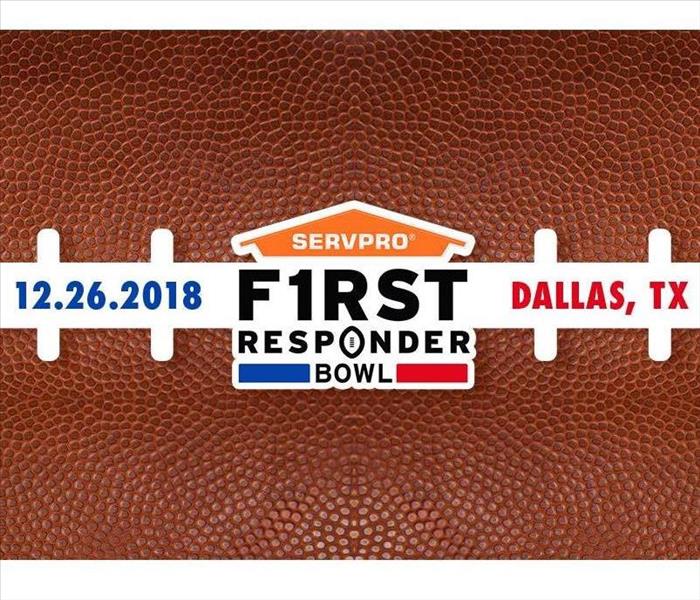 First Responder Bowl
First Responder Bowl
Union, MO (Grassroots Newswire) <Date> -- SERVPRO is proud to announce the inaugural SERVPRO First Responder Bowl being played at historic Cotton Bowl Stadium. The newly renamed bowl is designed to honor the sacrifice and service of the brave men and women who are the first line of defense in local communities in Franklin County, MO when the unexpected or the unthinkable happens says Jerry Alvey of SERVPRO of Franklin County. Kickoff for the event, televised by ESPN, is December 26 at 1:30 ET.
“It’s a privilege to have the SERVPRO name associated with an event that celebrates the dedication and selflessness of first responders,” said Alvey. “These men and women are true hometown heroes and first on the scene when disaster strikes, helping to save lives and protect property.”
The SERVPRO First Responder Bowl will honor first responders including police officers, firefighters, EMS workers, correctional officers, search and rescue teams, dispatchers, security guards, federal agents, border patrol agents, and military personnel who have specialized training and are the first to arrive and provide help at the scene of an emergency. Event organizers planned to distribute 10,000 complimentary tickets to verified first responders and their families who sign up at https://www.firstresponderbowl.com/first-responders. These complimentary tickets are possible thanks to corporate sponsors like SERVPRO and individual fans who chose to “Sponsor a Responder” with a $15 donation when they purchase their general admission tickets.
“The SERVPRO First Responder Bowl is a celebration of the commitment to service demonstrated by the everyday people who willingly put themselves in harm’s way to protect the lives and property of their neighbors,” said Sue Steen, CEO of SERVPRO Industries, Inc. “SERVPRO is honored to have this opportunity to shine a spotlight on all of these hard working first responders, and their families, and to recognize them for the heroes they are.”
###
About SERVPRO® Founded in 1967, the SERVPRO Franchise System is a leader and provider of fire and water cleanup and restoration services and mold mitigation and remediation. SERVPRO’s professional services network of more than 1,700 individually owned and operated Franchises responds to property damage emergencies ranging from small individual disasters to multi-million dollar large-loss events. Providing coverage in the United States and Canada, the SERVPRO System has established relationships with major insurance companies and commercial clients, as well as individual homeowner.
Local SERVPRO Fire Damage Restoration Specialist Offers Union Families Tips on Cooking Up a Safe Holiday Season
11/19/2018 (Permalink)
Union, MO (Grassroots Newswire) November 5, 2018 -- Holiday party planning begins now for many families, and Gerald Alvey of SERVPRO of Franklin County offers some important reminders to Union residents to help ensure this season glows with the warmth of good food and good friends, and not with the glare of a devastating home fire.
“The holiday season is a time when many families plan big and elaborate meals for large groups of people,” says Alvey. “But all that cooking creates an extraordinary risk of fire. For a safe and festive holiday season, it’s important to understand that risk and take steps to minimize it.”
Cooking Fire Safety
Research from the National Fire Protection Association (NFPA) reveals that in 2017, on average, U.S. fire departments responded to a home fire every 88 seconds.1 Cooking equipment was the leading cause2 of home fires and fire injuries, causing 47 percent of home fires. These fires resulted in 20 percent of the home fire deaths and 45 percent of the injuries.
“Union, MO families should keep these statistics in mind as the holidays approach. According to the NFPA, Thanksgiving is the peak day for home cooking fires, followed by the day before Thanksgiving, Christmas Day, and Christmas Eve2,” says Alvey. “Families should also be aware that frying poses the greatest risk of fire, in fact, the NFPA discourages the use of outdoor gas-fueled turkey fryers that immerse the turkey in hot oil.3 This video graphically illustrates the danger these devices can pose.” https://youtu.be/j3rF8F0JQRQ
Alvey offers these additional cooking safety tips from FEMA’s U.S. Fire Administration.4
- Keep an eye on what you fry: If you see any smoke or the oil starts to boil, turn the burner off.
- Stand by your pan: If you leave the kitchen, turn the burner off.
- Turn pot handles toward the back of the stove so that no one can bump them or pull them over.
- Wear short sleeves or pull sleeves up: 18 percent of cooking fire fatalities in 2016 were caused by ignited clothing.2
- Keep a pot lid or cookie sheet nearby to cover a pan if it catches on fire.
“Taking common sense precautions like these and keeping kids and pets out of the kitchen during meal prep can help keep your holiday celebrations safe,” says Alvey. “The precautions you take could help prevent a devastating home fire, a tragic injury, or even the loss of life. While SERVPRO disaster response professionals are fire damage restoration specialists, they know how important it is to keep the focus on fire prevention, because for some types of loss, there is no remediation.”
SERVPRO is an industry leader and provider of fire and water cleanup and restoration services. For more fire prevention and fire safety tips and information about fire and water damage restoration services, please visit www.SERVPRO.com.
For more information on SERVPRO of Franklin County, please contact Gerald Alvey at (636) 583-5200 or admin@SERVPROoffranklincounty.com.
Citations
- https://www.nfpa.org/News-and-Research/Fire-statistics-and-reports/Fire-statistics/Fires-in-the-US
- https://www.nfpa.org/-/media/Files/News-and-Research/Fire-statistics-and-reports/Fact-sheets/CookingFactSheet.ashx?la=en
- https://www.nfpa.org/Public-Education/By-topic/Top-causes-of-fire/Cooking/Turkey-fryers
- https://www.usfa.fema.gov/prevention/outreach/cooking.html
About SERVPRO®
Founded in 1967, the SERVPRO Franchise System is a leader and provider of fire and water cleanup and restoration services and mold mitigation and remediation. SERVPRO’s professional services network of more than 1,700 individually owned and operated Franchises responds to property damage emergencies ranging from small individual disasters to multi-million dollar large-loss events. Providing coverage in the United States and Canada, the SERVPRO System has established relationships with major insurance companies and commercial clients, as well as individual homeowners.
###
Marilyn Lakaner - American Family Insurance
9/7/2018 (Permalink)
Agent Spotlight
Year Started: Dec 1993
Address: 650 Fisher Drive, Sullivan MO
Hours: Monday – Friday 8:00 am to 5:00 pm Phone: 573-860-2052
Website: marilynlakaner.com
- What types of insurance does your business specialize in?
We primarily insure auto, home, business and life. - What made you decide to become an insurance agent, and how long have you been one?
I started out in 1988 working as a secretary for another agent in Cuba, MO. I was offered, seven years later, an opportunity to have my own agency here in Sullivan. - What do you enjoy most about doing business in your community?
I really enjoy clients coming by the office. That’s one thing that I love about being in a small town. We have monthly interactions with so many people. We know when they get married, buy a home, have children and grandchildren. I love seeing families grow and succeed. - In what ways does your business support your community?
I’m involved in the Sullivan Rotary club and currently serve as secretary. I’m a member of the Sullivan Area Chamber of Commerce as well. - Have you ever needed the services of SERVPRO? If so, what was your experience?
I have never personally needed the services of SERVPRO, but my clients have. - Have your clients who’ve used SERVPRO been happy with our services?
SERVPRO does a great job in being proactive with my clients and getting the job done! - What is your favorite part about your job? My job is rewarding because I, and American Family, help our clients through some of the toughest experiences of their lives. It’s what we do, it’s what we promise.
- Share some personal information! Do you have a spouse/ kids/ pets?
I’m married to John (for 34 years) and we have 3 grown children. We also have an 8 year old golden-doodle named Niko. - Outside of work, what is your hobby? Believe it or not, I also own a fudge shop!
- Is there a motto you follow, or words you live by?
Mom always told us to “always tell the truth and you’ll never have to remember what you said.” - Would you like to add anything else? I want to thank you for always offering us free continuing education classes close to home! Living out in the country, we usually have to travel to attend classes, but you have made it more accessible to me and many other rural agencies to get the classes needed, closer to home.
Getting Started with the Emergency READY Program
5/23/2018 (Permalink)
 Emergency READY Program SERVPRO
Emergency READY Program SERVPRO
As many as 50% of businesses close down following a disaster, according to the latest research. Of the businesses that survive, the overwhelming majority of them had a preparedness plan in place. Pre-planning can serve as an insurance policy aimed at peace of mind. And knowing you are "Ready for whatever happens" speaks trust to your clients and employees that in the event your business is affected by a disaster, they don't necessarily have to be.
By developing a SERVPRO Emergency Ready Profile for your business, you minimize business interruption by having an immediate plan of action. Knowing what to do and what to expect in advance is the key to timely mitigation and can help minimize how water and fire damage can affect your business.
Getting Started with the Emergency READY Program
- STEP 1: Visit SERVPRO.com/ready. Register for an account using your email address as your username and choose a password.
- STEP 2: Choose your preferred SERVPRO Franchise Representative to contact in the event your home or business experiences water, fire, mold or other type of damage.
- STEP 3: Begin creating ERPs for all of your properties.
- STEP 4: Download the SERVPRO Ready Plan Application on your iPhone, tablet, Android or Blackberry device from the respective App Store.
- STEP 5: Launch the Ready Plan App and sign in using the same username and password from STEP 1.
At this point, it may take a few minutes for the data to sync. All of your ERP information will appear on your tablet or mobile device. You can now access and manage ERP information from your computer, tablet or smartphone.
Ask your SERVPRO of Franklin County representative about our Emergency Ready Profiles!
May is National Building Safety Month
4/30/2018 (Permalink)
 Building Safety Month
Building Safety Month
Building Safety Month— in its 38th year—is an initiative of the International Code Council (ICC) and their 64,000 members across the world, as well as their partners in building construction and design and the safety community. Building Safety Month is an opportunity to educate insurance and commercial property professionals, as well as the general public, on “what it takes to create safe, resilient, affordable, and energy efficient homes and buildings,” according to the ICC website.
The theme for 2018 is Building Codes Save Lives with a focus on safer communities over the five weeks in May.
One of the topics highlighted during the third week of the month is Protecting Communities from Disasters.
The general public may not be aware how codes and code officials “improve and protect the places where we live, learn, work, worship, and play,” and this month can certainly improve that awareness and educate communities on this topic!
IMPORTANT TIPS FROM THE ICC
Disaster Safety & Mitigation
- If you live in a high wind or hurricane-prone area and do not have tested and code-approved shutters for protection from windborne debris, consider temporarily protecting your doors and windows by mounting exterior grade, 7/16" minimum thickness plywood and fastening it into place. Visit www.flash.org for detailed instructions on how to use plywood for emergency board-up.
- Consider building or retrofitting to create a tornado-safe room in your home. Follow ICC/ NSSA 500 Standard for detailed construction information and to ensure you achieve the highest level of protection for your family.
- In wildfire prone areas, remove fine (dead grass, leaves, etc.) and coarse (dead twigs, branches, etc.) fuels within 30 feet of a building to create a survivable space in case of wildfire. Be sure to remove dry leaf and pine litter from roofs, rain gutters, decks, and walkways. Follow ICC’s International Wildland-Urban Interface Code® for detailed requirements.
- Flooded roads could have significant damage hidden by floodwaters. Never drive through floodwaters or on flooded roads. Do not attempt to cross a flowing stream. It takes only six inches of fast flowing water to sweep you off your feet and two feet of water to move an SUV-sized vehicle.
- Source: iccsafe.org
History of the Union Fire Protection District
1/22/2018 (Permalink)
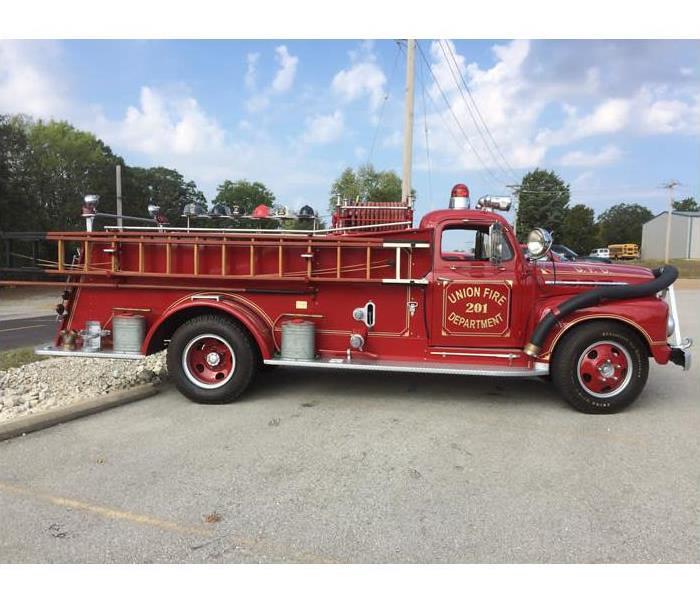 Union Fire Protection District
Union Fire Protection District
The Union Fire Protection District has been a staple of the community for over 100 years. The fire department was created on July 19, 1890, when an ordinance was passed to “Establishment of Fire Department.” It was then that the first Fire Captain, First Assistant, Second Assistant and Secretary were elected. The ordinance remains in the fire department’s by-laws along with additions and some deletions.
The engine house was located northeast of the old jail building, behind Busch’s Hardware Store. In 1906, a fire bell tower was built and completed in 1906. The first fire siren was bought in 1921 and was placed on the roof of Citizens Bank.
The department’s first fire truck was obtained in 1924, when the city contracted with General Fire Mfg. Co. It was a $4,000 Republic Motor Truck, and 11 volunteer fire fighters who expressed willingness to learn to operate the truck and equipment.
In April 1933, the Franklin-Gasconade Fire Fighters Association was formed in Union. The organization still exists today. On August 14, 1945, after the Japanese surrendered and effectively ended World War II, the Department went out and gathered a band for a street dance.
The Department moved into a new fire house in 1949 on the corner of Church and East Locust. In 1961, the Department joined the Fire Fighters Association of Missouri, and are still members today.
The city of Union passed a bond issue in 1964 for an addition to the fire house, said issue was dedicated in 1965. In 1969 the Department received a 1953 Jeep from the Conservation Department to be used for fighting brush fires.
In September of 1971, the people of Union voted to form the Union Volunteer Fire Protection District.
In January of 1977, the District leased a warehouse from Jim Straatmann in North Union. The warehouse eventually became the North Station.
The Union Volunteer Firefighters helped sandbag, tie down propane tanks, and pump out basements in what was called the “500-year flood” of the Bourbeuse River in December 1982.
The new station 3 was open May 12, 2002. Today, the Union Fire Protection District consists of 15 full time career firefighters and 30 active volunteer firefighters.
The Union fire department continues its rich history to this day as it selflessly protects and serves our area.
Dangers of EXTREME COLD
12/27/2017 (Permalink)
According to the National Weather Service, $2.84 million dollars of property damage was caused by extreme cold in 2015.
Even scarier? Fifty-three people died and three were injured due to extreme cold the same year. It is important to be aware of the effect extremely cold temperatures can have on you.
The two main conditions to be aware of are frostbite and hypothermia.
Frostbite is caused when your skin is exposed to extremely cold temperatures. Physical symptoms are white or grayish-yellow skin, skin that feels unusually firm, or waxy numbness.
Hypothermia is when your body temperature falls to an abnormally low temperature, caused from long exposure to cold weather. Signs of hypothermia include shivering, exhaustion, confusion, fumbling hands, memory loss, slurred speech, and drowsiness.
If someone’s body temperature is below 95°F, seek medical attention immediately. To avoid these conditions, stay indoors if possible. If not, dress warm in layers and try to keep dry.
Source: ready.gov/winter-weather
Spooky Truths Regarding Halloween Safety On and Off the Road
10/4/2017 (Permalink)
 Halloween Safety
Halloween Safety
Kids love the magic of Halloween: Trick-or-treating, classroom parties and trips to a neighborhood haunted house.
But for moms and dads, often there is a fine line between Halloween fun and safety concerns, especially when it comes to road and pedestrian safety.
In 2015, about 6,700 pedestrian deaths and 160,000 medically consulted injuries occurred among pedestrians in motor vehicle incidents, according to Injury Facts 2017, the statistical report on unintentional injuries created by the National Safety Council.
NSC research reveals about 17% of these deaths occurred when pedestrians improperly crossed roads or intersections. Lack of visibility because of low lighting or dark clothing accounted for about 15% of the deaths. Other circumstances varied by age: Darting or running into the road accounted for about 15% of deaths in kids ages 5 to 9 and 7% for those 10 to 15.
In the U.S., October ranks No. 2 in motor vehicle deaths by month. NSC data put August first, with 3,642 deaths, followed by October, 3,550, and July, 3,530.
Follow These Ghoulishly Good Best Practices
To help ensure adults and children have a safe holiday, the American Academy of Pediatrics has compiled a list of Halloween Safety Tips, including do's and don'ts on the trick-or-treat trail:
- A parent or responsible adult should always accompany young children on the neighborhood rounds
- If your older children are going alone, plan and review the route that is acceptable to you
- Agree on a specific time when children should return home
- Only go to homes with a porch light on and never enter a home or car for a treat
Children and adults are reminded to put electronic devices down, keep heads up and walk, don't run, across the street. NSC offers the following safety tips for parents – and anyone who plans to be on the road during trick-or-treat hours:
Safety Tips for Motorists
- Watch for children walking on roadways, medians and curbs
- Enter and exit driveways and alleys carefully
- At twilight and later in the evening, watch for children in dark clothing
Trick-or-Treating
- Instruct your children to travel only in familiar, well-lit areas and avoid trick-or-treating alone
- Tell your children not to eat any treats until they return home
- Teach your children to never enter a stranger's home
Costumes
- All costumes, wigs and accessories should be fire-resistant
- If children are allowed out after dark, fasten reflective tape to their costumes and bags to make sure they are visible
- When buying Halloween makeup, make sure it is nontoxic and always test it in a small area first
- Remove all makeup before children go to bed to prevent skin and eye irritation
Source: http://www.nsc.org/learn/safety-knowledge/Pages/halloween-safety.aspx
Business Spotlight: ELS Properties
7/13/2017 (Permalink)
Business name:
ELS Properties
Year started: 2006
Address, hours and phone:
Physical: 407b Prairie Hill Court, Union, MO
Mailing: P.O. Box 1052 Union, MO 63084
Hours:Monday through Friday 8:30 – 5:00
Phone: 636-744-8585
Website: www.els-properties.com
Your Name: Ed Schmelz
What does your company do?
Provide quality rental properties to the community
What makes your company special?
We are locally owned and operated
What do you like most about doing business in your community?
I was born and raised in Union. I think it is a great town to live in and raise a family.
How do you support the community?
I do a lot of building in the area. I do everything I can to use local suppliers and contractors in order to spend and keep money in Union.
Personal info about yourself, married, kids: I have been married for 12 years to my wife, Cassie. We have two girls, Elliot and Eve, age 11 and 7.
Do you have a motto or words to live by?
If it was easy, everyone would be doing it.
Will Flooding Continue?
6/29/2017 (Permalink)
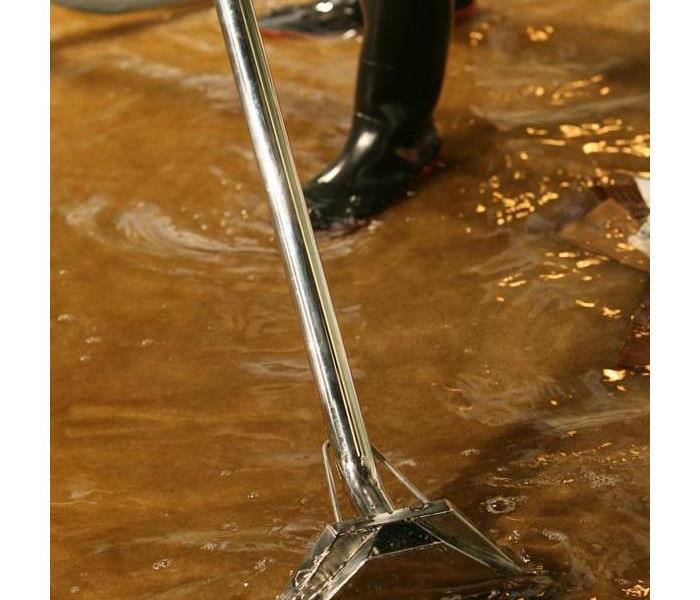 Franklin County, MO - Flooding 2017
Franklin County, MO - Flooding 2017
For the second time in a little over a year, our state and county were hit hard by flooding. The storms of late April and early May resulted in evacuations, hundreds of road closures, damage to businesses and residences and five fatalities.
When the rain finally let up and the water crested, an estimated $86 million worth of damage was done in Missouri, including $28 million in costs for individuals whose homes and belongings were affected. The number of homes destroyed by the flooding totaled 369, while 848 had major damage.
Unfortunately, major flooding in the region has become more common in recent years. In December 2015, an estimated $56 million in damage was caused by flooding.
The cities of Franklin County haven’t been immune from the flood damage, as areas along the Bourbeuse, Missouri and Meramec Rivers have been devastated, and at least 12 rivers and major creeks saw record flooding in 2017.
In both the 2015 and 2017 floods, flood water reached up to 5 feet. Currently, codes require new buildings to be built 1 foot above the basic flood level, but some homes that were elevated to 2 feet above the base level still received water on the floor in the most recent flooding.
After two major floods in a 17-month span, the question is, will major flooding become the new norm?
Flooding is the most common and costly natural disaster in the United States, according to the Insurance Information Institute, and it is the most frequent reason for declaring a federal disaster.
Missouri has two types of ways floods develop – flash floods and overbank flooding. Flash floods are quick rising floods and normally occur as a result of unusually intense rains over a short period of time, usually hours. Overbank flooding is commonly found in the Midwest and occurs when rivers reach their capacity and can no longer hold excess rain water or ice melt.
The recent floodings were of course due to intense amount of rains, but there is another culprit – us. We use levees as a means of protection, but sometimes they can be just as harmful as they are helpful. Levees can disrupt the natural flow of rivers, which result in catastrophic events. As more businesses and houses have been built near rivers in recent years, more levees have been built. Levees narrow and straighten the river which forces water to flow higher and faster, instead of outward which slows the river as it spreads.
And although it’s impossible to say how much of a role climate change played in the flooding, many scientists believe it has caused more unpredictable and vicious storms in recent years.
If the trend continues, we could see flooding be more commonplace. If that is the case, it’s important to have a plan in place to deal with the water.
SERVPRO of Franklin County is here to help in any disaster situation. If it’s a residential loss, we want to have your family back at home as soon as possible. If It’s a commercial loss, our goal is to have your business up and running in no time.
To be prepared, SERVPRO recommends using our free service, the Emergency Ready Profile. By developing a SERVPR ERP for your home or business, you minimize business interruption by having an immediate plan of action. Knowing what to do and what to expect in advance is the key to timely mitigation and can help minimize how water and fire damage can affect your home or business.
.Information in this article was found on moenvironment.com, emissourian.com and stltoday.com.
Upcoming CE Credit Courses
1/25/2017 (Permalink)
We have several CE credit course coming up this year.
On 2/28/2017 we will be holding a class on Ethics. This class will be from 9am to 12pm. It is a 3 credit hour course.
On 3/21/2017 we will be holding a class on Understanding Mold. This class will be from 8am to 12pm. It is a 4 credit hour course.
On 4/18/2017 we will be holding a class on Understanding the Restoration Industry: Property Fire Damage Restoration. This class will be from 8am to 12pm. It is a 4 credit hour course.
On 5/16/2017 we will be holding a class on Hoarding in the Insurance Industry (Course topic tentative). This class will be from 10am to 12pm. It is a 2 credit hour course.
All classes will be held at the Union Fire House located at 1401 W. Springfield Ave. Union, MO 63084.
100% attendance is required to receive CE credits for each course.
We will have coffee, water, and soda available. We will also provide a light breakfast and lunch.
Class size will be limited so please RSVP in advance.
To reserve, you may call us at 636-583-5200 or email iking.spfc@gmail.com.
Please remember to include your name, insurance agency, producer/insurance broker number, phone and email.
Fighting the flu
11/17/2016 (Permalink)
The winter months bring family celebrations and holidays, but it also brings the flu. Though the timing of the flu can vary from season to season, according to the Centers for Disease Control and Prevention (CDC), flu season can begin as early as October and continue to occur as late as May. Flu activity most commonly peaks in January or February.
The CDC recommends a yearly flu vaccine as the single best way to prevent the flu. Flu vaccinations are available throughout flu season. Flu vaccinations are recommended for everyone six months or older. It is especially important people at high risk of flu complications like young children, pregnant women, people with chronic health conditions and anyone 65 years or older receive a flu vaccination. If you have questions about getting a flu vaccine, consult your health care provider.
What can you do to stay healthy this flu season?
-Avoid close contact with people who are sick. When you are sick, keep your distance from others to protect them from getting sick too.
-Cover your mouth and nose with a tissue when coughing or sneezing. n Washing your hands often will help protect you from germs. If soap and water are not available, use an alcohol-based hand sanitizer. N
-Practice good health habits. Get plenty of sleep, be physically active, manage your stress, drink plenty of fluids, and eat nutritious food.
Frozen Pipes
11/15/2016 (Permalink)
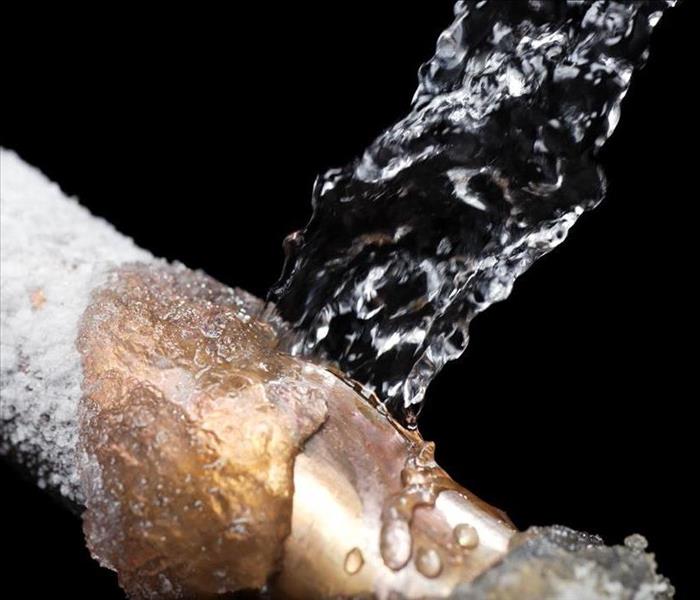 Frozen Pipes
Frozen Pipes
With dangerously cold weather on it's way, SERVPRO of Franklin County would like to keep you informed about the messy and possibily destructive issue of frozen pipes. This article provides information around how to prevent water pipes from freezing, how to thaw pipes should they freeze, and what to do if your pipes burst.
Why do pipes freeze?
Water expands as it freezes, this puts pressure on whatever is containing it, whether metal or plastic pipes. No matter the durability of the container, expanding water can cause pipes in your home to break. Pipes exposed to the severe cold, like outdoor hose bibs, water sprinkler lines, and water supplies pipes in unheated or unfinished areas such as basements, crawlspaces, attics, garages or kitchen cabinets. Pipes against exterior walls that have little or no insulation are at risk for freezing.
What can I do to prevent frozen pipes?
Before the cold sets in, you can attempt to prevent freezing by:
- Drain water from swimming pool and water sprinkler supply lines. Be sure to follow your manufacturer’s or installers directions.
- Remove, drain, and store hoses used outdoors. Close inside valves supplying outdoor hose bibs. Open outside hose bibs to let water drain. Keep the outside valve open so any water remaining in the pipe can expand without causing the pipe to break.
- Check around for unheated supply lines. Check the basement, crawlspace, attic, garage, and under kitchen and bathroom cabinets. Both hot and cold pipes need to be insulated.
- Consider installing products made to insulate pipes like a “pipe sleeve” or UL-listed “heat tape” or “heat cable” or similar materials on exposed water pipes. Even ¼’ of newspaper can provide significant protection in areas that usually do not have frequent or prolonged temperatures below freezing.
What can I do during cold weather?
- Keep garage door closed if there are supply lines in the garage.
- Open kitchen and bathroom cabinet doors to allow warmer are to circulate around pluming.
- Let the cold water drip from the faucet served by exposed pipes. Running water through the pipe helps prevent pipes from freezing.
- Keep the thermostat set to the same temperature both during the day and at night.
- If you will be going away during cold weather, leave the heat on in your home, set to a temperature more than 55° F.
What can I do if I think my pipes have frozen?
If you turn on a faucet and only a trickle comes out, suspect a frozen pipe. Keep the faucet open. As you treat the frozen pipe and the frozen area begins to melt, water will begin to flow through the frozen area. Running water through the pipe will help melt ice in the pipe.
- Apply heat to the section of pipe using an electric heating pad wrapped around the pipe, an electric hair dryer, a portable space heater (kept away from flammable materials), or by wrapping pipes with towels soaked in hot water. Do not use a blowtorch, kerosene or propane heater, charcoal stove, or other open flame device.
- Apply heat until full water pressure is restored. If you are unable to locate the frozen area, if the frozen area is not accessible, or if you cannot thaw the pipe, call a licensed plumber.
- Check all other faucets in your home to find out if you have additional frozen pipes. If one pipe freezes, others may freeze, too.
What if my pipes burst?
When your home is being threatened by water damage from a burst pipe or any type of water damage from flooding or leaks, SERVPRO of Franklin County has the expertise to prevent or mitigate the devastating effects water damage can have in order to help preserve and restore your property. We have the equipment and experience necessary to handle the most challenging water damage and removal situations and are available around-the-clock. We concentrate on safely drying, deodorizing and disinfecting the areas flooded or damaged by water. When fire and water take control of your life, we help you take it back.
Contact SERVPRO of Franklin County Regarding Your Water Damage Emergency (636) 583-5200
Source: http://www.redcross.org/prepare/disaster/winter-storm/preventing-thawing-frozen-pipes
National Preparedness Month Focuses Home and Business Owners on Advance Planning for Disaster Recovery
9/15/2016 (Permalink)
SERVPRO offers Union, MO property owners no-cost tools for preparing a disaster readiness plan
Union, MO (Grassroots Newswire) August 30, 2016 — Each September, the Federal Emergency Management Agency (FEMA) sponsors an awareness event—National Preparedness Month (http://www.ready.gov/September) —to encourage both home and business owners to review and update their emergency preparedness and business and life continuity plans. Gerald Alvey, owner of SERVPRO® of Franklin County, encourages Union property owners to take advantage of the information available from FEMA, because advance planning is critical in dealing with and recovering from the unexpected. “Most home and business owners have taken basic precautions to protect life and property in the event of an emergency like flooding, fire, wind damage, or even malicious attacks,” said Alvey. “In many cases, building codes require clearly marked emergency exits, fire extinguishers, fire and flood drills, and similar preparations. But the missing link for many property owners is a comprehensive emergency plan that provides first responders with the information they need to deal with the emergency quickly and effectively, like the location of shut-off valves, fire suppression system controls, and emergency contact numbers.” SERVPRO offers tools for both commercial and residential property owners to help address this problem. Business and home owners alike can download the free SERVPRO READY app, and store time-critical contact and property information electronically, in advance, where it can be accessed with a mobile device in seconds if disaster strikes. In addition, when a business designates their local SERVPRO Franchise Professional as their disaster mitigation and restoration provider, SERVPRO professionals will conduct a no-cost assessment of the facility and assist the owner in completing a comprehensive Emergency READY Profile® (ERP). The ERP includes information about emergency contact numbers, priority and high/risk areas, shut-off valve locations and more that can then be stored in the READY app. “The most effective response to any emergency is a fast response,” says Alvey, “and that means having critical information available and ready to access at a moment’s notice. FEMA statistics* show that as many as 40 percent of businesses never reopen after a major flood disaster. Minimizing downtime and repairs with a quick, effective response effort can help prevent this type of outcome for businesses and can also help families put their homes and lives back on track in less time and with less stress. Creating a READY profile in advance with SERVPRO’s no-cost tools is well worth the time.” SERVPRO® of Franklin County specializes in disaster restoration, cleanup and repair services, helping to remediate damage, making it “Like it never even happened,” for both commercial and residential customers. For more information on SERVPRO® of Franklin County, please contact Gerald Alvey at (636) 583-5200 or admin@SERVPROoffranklincounty.com. For more information on the SERVPRO® and the SERVPRO® Emergency READY Program, please visit www.ready.SERVPRO.com. *www.fema.gov/protecting-your-businesses
About SERVPRO®
Founded in 1967, the SERVPRO® Franchise System is a leader and provider of fire and water cleanup and restoration services and mold mitigation and remediation. SERVPRO’s professional services network of more than 1,700 individually owned and operated Franchises responds to property damage emergencies ranging from small individual disasters to multi-million dollar large-loss events. Providing coverage in the United States and Canada, the SERVPRO® System has established relationships with major insurance companies and commercial clients, as well as individual homeowners.
Business Spotlight - Employee Staffing Group - Union, MO
4/29/2016 (Permalink)
Business name:
Employee Staffing Group
Address, hours and phone number:
#3 Prairie Dell Road, Suite E, Union, MO 63084
Website:
www.employeestaffinggroup.com
What does your company do?
Employee Staffing Group is a certified employment staffing agency located in Franklin County, Missouri. We have over 40 years of combined experience with creating reliable and efficient workforces for our customers. We do this through superior interviewing techniques, stringent background checks, drug screening, and comprehensive company and position specific testing. We take pride in being small enough to care, yet big enough to service the needs of our customers entirely.
What makes you special?
Our 24 hour a day customer service and impeccable placement abilities.
What do you like most about doing business in your community?
The people, I absolutely love helping people find work, and helping someone turn things around and get back on their feet. Franklin County has some of the best people I have ever met. I enjoy working daily with my clients to form a partnership to find quality candidates for their facilities.
How do you support the community?
Employee Staffing Group and our employees participates in several charities and also donates time to the Ronald McDonald House. I also have become involved in several community events, and actively donate to our troops, and ALIVE. I volunteer on several different Chamber of Commerce committees throughout Franklin County.
Who are your ideal clients or customers?
Manufacturers
Personal info about yourself, married, kids:
Lisa Novotny, has an extensive background in office management and sales. When Lisa isn't working she enjoys outdoor activities such as gardening, bicycling, and camping with her family and friends. Lisa has a daughter who will be celebrating her 21st birthday in May, they plan taking a girls weekend to Las Vegas to celebrate her birthday.
Where did you grow up?
I grew up in the Fenton area, and have been a resident of Jefferson County most of my life. I did spend about 5 years living in Columbia, MO which I did enjoy, but being away from my family was tough and I choose to move back to the Fenton area.
Do you have a motto or words to live by?
Treat people the way you want to be treated
Continuing Education
4/29/2016 (Permalink)
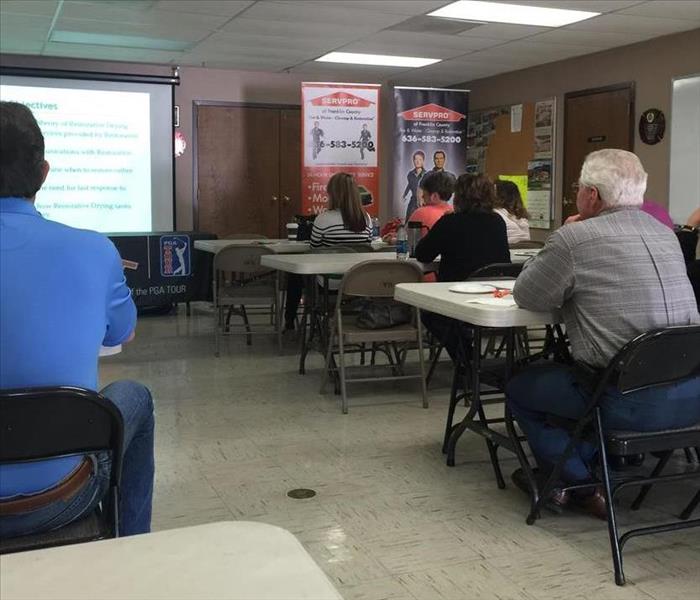
Face it, at some point all agents and brokers and even adjusters need Continuing Education (CE) credits. Are you always waiting till the last minute to get your credits? This usually results in marathon computer session a few days before your credits are due. Certainly it’s nice that you can get your CE credits caught up that way, but is it really a valuable experience? A lot of agents relate to me what a horrible experience it is to cram all of the needed classes into a short time. Plus the online classes can be quite expensive.
We can offer a much better and much more pleasant way for you and/or your staff to get their needed credits. We have always offered a couple CE classes each year but this year we are taking it to a different level. We are offering various classes every other month throughout the year. To date, I have already taught three classes and have four more scheduled. That’s a total of twenty plus available credits this year, including the always popular Ethics Class. We make sure that these classes take place throughout the Franklin County area to so that it’s convenient for everyone.
Everyone has had to take an online class from time to time. But most people tell me they don’t get much out of them. I just taught a Water CE class last week were an agent came up to me and said he learned so much more than on line classes. The group discussion was great and he was going back with information he can help his clients out with. We love to hear that and that is certainly the goal. Don’t forget that our CE classes are always free and we always feed you!
Being that the CE classes are regulated by the Missouri Department of Insurance, we have some rules and regulations that are a must. Typically our class has to be registered within 35 days of the scheduled date. The class must last at least as long as the amount of credits you are getting. We will always need you to fill out the roster and provide your agents or broker’s license number. Of course you must attend the entire class to get your credit. That’s it, it’s pretty simple. You’re in and out in a few hours, to get good food and your CE credits are satisfied. What else could you ask for!
One thing we want you to know is that we are always willing to set up a private class for you. Just make sure we have enough time to register it with the state. We can do it for your office, your company, you and your colleagues. Pretty much whatever you want. We would like to have at least a minimum of three or four attendees to make it worthwhile. If this is something you’re interested in, let me or Hannah know. We would love to do it for you and we would probably bring you lunch to!
Below is a list of CE topics that are available. We also have a 1 hour lunch and learn CE class we have, but it’s not listed. We hope to see you at our next class in June. Don’t forget to contact us if you want to set up a private class or a lunch and learn. As always, Stay Green. Jerry
Approved Courses - Insurance
Understanding the Restoration Industry: Property Fire Damage Restoration
4 Credit Hours
Understanding Mold in the Restoration Industry
4 Credit Hours
Understanding Mold in the Restoration Industry - 2hr
2 Credit Hours
Restoring Contaminated Buildings
2 Credit Hours
Restorative Drying for Water Damage
- 2hr
2 Credit Hours
Restorative Drying for Water Damage - 4hr
4 Credit Hours
Cleaning & Restoring Smoke-Damaged Contents
2 (1 credit)
Ethics
3 Credit Hours
Biohazard Cleanup
2 Credit Hours
Restorative Drying CE Class held at Union Fire Department
4/15/2016 (Permalink)
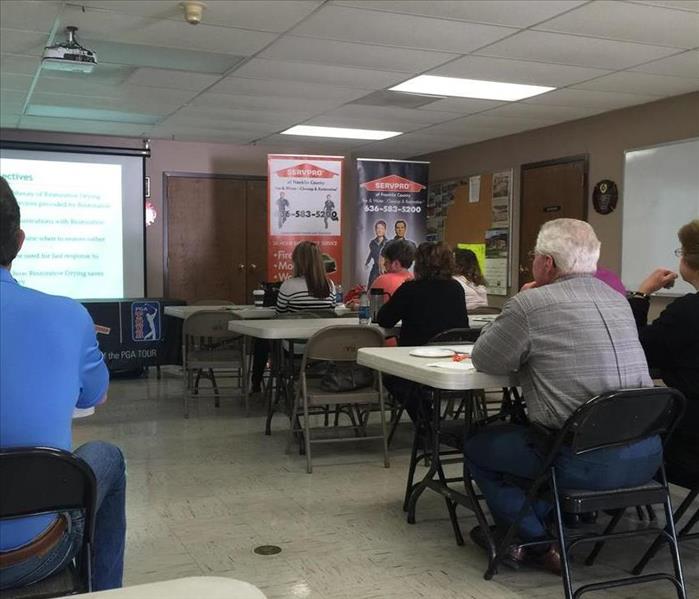 Ce Class Held
Ce Class Held
Thank you to everyone who attended our Restorative Drying for Water Damage CE class at the Union Fire Department on 4/14/16.
Class description was as follows:
This course has been specifically designed to teach and explain the special procedures used by professionals in drying buildings and contents. It involves four types of services including inspection of the loss, emergency services, monitoring services and restoration services. You will learn what takes place at a water damage work site during each type of service and the five fundamental principles of water damage restoration which are described by the water restoration industry in an industry standard called the Clean Trust S500 Water Damage Restoration Standard. We will cover the key questions a restorer asks when inspecting a wet building on the first visit to the loss site and also when the restorer checks on the drying progress of the building during the several days the wet materials are drying.
We hold CE classes often, so please check with our office at 636-583-5200 or contact Hannah via email: hannah@SERVPROoffranklincounty.com for more information.
Now Hiring
3/22/2016 (Permalink)

We're hiring!
SERVPRO ® Business Development Representative (BDR)
SERVPRO® of Franklin County is seeking someone who is comfortable meeting new people, with excellent communication skills, and who is a serious multi-tasker. You will be responsible for accelerating sales volume by creating new customer relationships while further developing existing accounts. Working alongside our highly competent service team, you will manage all aspects of the sales process to ensure high customer satisfaction levels while developing long-term relationships. The BDR will have primary responsibilities for compiling and maintaining "Centers of Influence" (COIs) information and conducting Objective-to-Objective marketing. He/she will also participate in professional Associations for networking, provide "lunch and learn" sessions, and promote Continuing Education (CE) courses to the community. In addition, the BDR will understand the basics of production and estimating processes. The BDR will complete marketing file documentation, as appropriate, and assist other departments, when necessary.
Minimum Requirements:
2 Year College Degree preferred.
4 + year(s) of Field Sales or Customer Service experience.
Outstanding written and verbal communication skills, including proper pronunciation, grammar, and a consistently courteous and professional tone of voice at all times.
Possess polite, confident, and excellent customer service skills, including listening and questioning skills.
Outgoing and upbeat personality
Ability to meet people in new or difficult situations and build rapport.
A passion for "Making the Sales"
Strong time management and organization skills, along with ability to multi task.
Proficient in Microsoft Office (i.e., Outlook, Word, Excel).
Professional appearance and demeanor.
Employment is contingent on successfully passing a background check.
Must have a valid driver's license.
Compensation & Benefits:
Monday -- Friday 7:30am -- 4:30pm, additional time as needed.
Position does require pursuing potential job leads 24/7. (Catastrophes occur anytime of the day) Base Salary + Commission + Bonuses (Based on qualifications met).
Paid Holidays and vacation
If you would like to apply to the open position, please send your resume to jalvey9662@aol.com.
Business Spotlight - Klak Management Corp
2/29/2016 (Permalink)
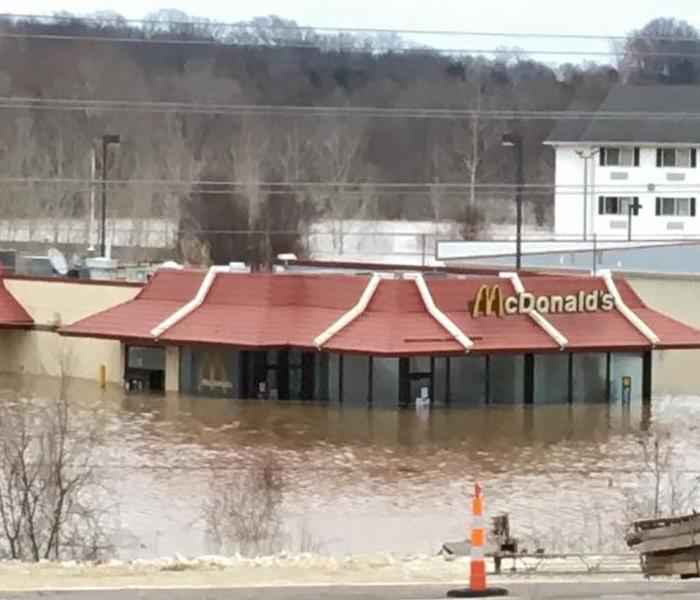 McDonalds in Union, MO - Dec 2015 Flooding
McDonalds in Union, MO - Dec 2015 Flooding
Mike Klak and his wife Deb own and operate four restaurants in Franklin County, including Washington, Pacific, St. Clair and Union, as well as four in St. Louis County — Allenton, Eureka, Peerless Park and Bowles Avenue, Fenton. They have owned McDonald’s locations in this area for 39 1/2 years. Mike Klak has been with the company for 57 years and Deb has been with the company for 52 years.
Mike Klak first started working as a crew member for a McDonald’s licensee in his hometown of Rock Island, Ill., in 1958, at the age of 15.
As he continued with his education after high school, Klak said he wanted to be an engineer. But he found that he was making more money and having more fun at McDonald’s. Over the years, though, he has used a lot of the engineering skills he gained at school while building stores and perfecting equipment.
In about 1967, Klak was promoted to supervisor in the “quad cities,” of Davenport and Bettendorf in Iowa and Moline/East Moline and Rock Island in Illinois. He was responsible for the operation of 15 McDonald’s locations in the Chicago and the Quad Cities area. In 1968, the McDonald’s Corporation acquired those 15 stores and Klak began working for the corporation.
Klak later moved to St. Louis and took over all the franchise stores in Missouri Tennessee, Kansas, Kentucky and Nebraska — a total of 400 stores.
From 1970-77, Klak oversaw the building of 25 restaurants per year as the director of sales service.
While working for the corporation, Klak was offered the opportunity to purchase his own store in 1977. The Klaks chose Washington as their home and opened the Washington restaurant in 1977. Klak said he’s most proud of moving to Washington, raising a family and continuing on the path of owning and operating McDonald’s restaurants.
The Union McDonald’s restaurant opened Dec. 9, 1992. The Klaks have decided to rebuild the Union restaurant to replace the current one damaged by the record-breaking flood in late December.
After the flood, Klak said she and her husband evaluated several things in deciding whether to remodel or rebuild, including structural damage, ADA improvements to be made and updating the theme.
“There was a lot of structural damage,” said Klak, noting the restaurant had about 5 feet of floodwater in the building.
Klak said she expects to break ground on the new restaurant by the beginning or middle of March. The building will be made of stone and brick, as opposed to plasterboard as it was before. A completion date has not yet been set.
The business will seek local vendors for electric, plumbing, ductwork, equipment installation and landscaping.
SERVPRO of Franklin County was pleased to assist Mike and Deb Klak with restoring items within the store that were salvagable.
There’s never a convenient time for flooding or water damage to strike your business. Every hour spent cleaning up is an hour of lost revenue and productivity. So when an emergency situation arises in your business, give us a call and we’ll be there fast with the help you need.
Water Damage or Flooding? Call Us Today (636) 583-5200
Articles from eMissourian:
http://m.emissourian.com/local_news/business/union-mcdonald-s-to-be-rebuilt-after-flood
http://m.emissourian.com/klak-honoredfor-his-years-with-mcdonald-sn-started-at-age
Flood of 1982
2/16/2016 (Permalink)
This flooding was part of a larger area of heavy rain, severe weather, and flooding that affected much of the Middle and Lower Mississippi Valley in December 1982 and January 1983. As is often observed during an historic flood event, this flood event was preceded by substantial rainfall in the days leading up to this event: 2 to 4 inches of rain fell over most of the Meramec, Black, Gasconade, and Cuivre River basins in the 10 days prior. Over the first 4 days of December, rainfall producing record flooding ranged from near 9 inches of rain at Troy (8.7”) up to over 13 inches over portions of southern Missouri. Six people died in the flash flooding associated with this event, two of them during a rescue attempt. Property losses included over 3,000 severely damaged residences and more than 700 completely destroyed. Almost 18,000 people were left homeless.
The flooding associated with this event was record-setting for at least 9 forecast points in Missouri, including the Moreau River at Jefferson City, the Gasconade River at Hazelgreen, Jerome, and near Rich Fountain, the Big Piney River near Big Piney, the Bourbeuse River at Union, the Meramec River at Pacific, near Eureka, and at Valley Park, and the Black River at Poplar Bluff.
Perhaps the most intriguing aspect of this flood involved the destruction of Times Beach, MO, just across the Meramec River from the river gage near Eureka. In the 1970s, the town paid a local contractor to spray an oil substance onto the streets of the town to help control the dust problems that had developed from the town’s unpaved streets. Just before the flood, it was discovered this oily substance contained levels of dioxin 100 times higher than what was considered hazardous to humans. The flood inundated homes with up to 10 feet or more of water. Though residents returned to their homes once floodwaters receded, the U.S. Environmental Protection Agency started the process of permanently buying out residents and businesses from the community in 1983. By the end of 1986, all residents had been relocated. Comprehensive cleanup of the site then began and was completed by 1997. This included on-site excavation and incineration of soil with high levels of dioxin. The site was opened to the public as the Route 66 State Park in 1999. Subsequent testing in 2012 revealed dioxin remaining on this land, but at levels considered to be safe for park visitors and park employees.
Source: http://www.floodsafety.noaa.gov/states/mo-flood.shtml
Business Spotlight - ChapelRidge Apartments - Union, MO
2/16/2016 (Permalink)
ChapelRidge Apartments
Business name:
ChapelRidge of Union Apartments
Year started:
2006
Address, hours and phone:
101 ChapelRidge Dr. Union Mo, 63084
Monday - Friday 8:30 am - 5:00 pm
636-583-1090
Website:
www.mccormackbaron.com
Your Name:
Lara Mooney
What does your company do?
Manage 168 unit apartment community
What makes your company special?
Friendly staff, 24 hour maintenance
What do you like most about doing business in your community?
Helping people find nice affordable housing and customer satisfaction
How do you support the community?
Activities, parties, food drive
Who are your ideal clients or customers?
Qualified Lower Income Applicants
Personal info about yourself, married, kids:
Married, 3 kids, Love the St Louis Cardinals
Where did you grow up?
Pacific- Eureka Area
Do you have a motto or words to live by?
The only way to do great work is to love what you do.
American Red Cross Blood Drive
2/16/2016 (Permalink)
Upcoming Blood Drive
SERVPRO of Franklin County is proud to partner with the American Red Cross, Farmers & Merchants Bank of St. Clair and Knights of Columbus St. Clair to offer a up coming blood drive for the community. The blood drive will be held at The Knights of Columbus Hall 204 South Commerical, St. Clair, MO. It will be held between the hours of 2pm-6pm on Thursday, 2/25/16.
While walkins are welcome, appointments are taken first. To make an appointment, visit the Red Cross website at RedCrossBlood.org and enter the sponser code KofStClair or call 1-800-RedCross
Be sure to bring a valid photo ID.
Benefits of Donating
- It feels great to donate!
- You get free juice and delicious cookies.
- It's something you can spare – most people have blood to spare... yet, there is still not enough to go around.
- You will help ensure blood is on the shelf when needed – most people don't think they'll ever need blood, but many do.
- You will be someone's hero – in fact, you could help save more than one life with just one donation.
Happy to help - Work begins on Union, MO McDonalds
2/4/2016 (Permalink)
SERVPRO of Franklin County is proud to assist McDonald's (Union, MO) in their reopening after the devastating floods. Cleaning and mitigation starts today. Look for your favorite fast food restaurant to reopen very soon.
Our highly trained technicians are ready to respond immediately to flood or water damage at your Union, MO property. We have the experience, expertise, and training to restore your home or business quickly and properly. We use advanced inspection and extraction equipment to find the water and remove it as quickly as possible. Our technicians will monitor and document the drying process to ensure your property is back to normal.
Please follow our tips outlined in the Water Damage Tips—Until Help Arrives Guide to protect yourself and your property.
Do You Have Water or Flood Damage?
Call Us Today – (636) 583-5200
Locally Owned Company with National Resources
We live and work in this community too; we might even be neighbors. As a locally owned and operated business, SERVPRO of Franklin County is close by and ready to respond to your flood or water damage emergency. We are proud to be an active member of the Union community and want to do our part to make our community the best it can be.
We are proud to serve our local communities:
Why Choose SERVPRO of Franklin County?
We’re Faster to Any Size Disaster
SERVPRO has over 1,650 U.S. and Canadian Franchise locations, strategically positioned to be faster to any size disaster. If your Union home or business is affected by water damage, we can provide an immediate emergency response that helps to prevent secondary damage and mold.
Learn More
We’re Highly Trained Water Damage Specialists
As leaders in the water damage industry, we have advanced training and expertise, not to mention a tremendous amount of hands-on experience. We use this training and experience to quickly dry your home and restore it back to pre-water-damage condition. Our process includes documentation of the drying process to validate your property is dry. Learn about our water damage training and certificates.
Learn More
We Use Advanced Drying Equipment and Techniques
Our advanced equipment helps to detect hidden moisture, extract the standing water quickly, and thoroughly clean and dry your home and belongings. We finish the job with professional deodorization and sanitizing agents for your comfort and safety.
Learn More
Our Water Damage Restoration Process
Every water damage situation is a little different, and requires a unique solution, but the general process stays the same. The steps listed below illustrate our process for the “typical” water damage emergency.
Step 1: Emergency Contact
Step 2: Inspection and Damage Assessment
Step 3: Water Removal/Water Extraction
Step 4: Drying and Dehumidification
Step 5: Cleaning and Repair
Step 6: Restoration
Happy to help - QuikTrip in Union, MO opens after flooding
1/11/2016 (Permalink)
After the Bourbouse River swelled to record levels, 8' of water surrounded Union area businesses. Approximately 6 inches of muddy water entered this building. SERVPRO was called in when the waters receded and immediately began extraction, sanitizing and drying. The store was back open in just about a week after mitigation began.
SERVPRO of Franklin County was proud to help a local business get back open quickly after waters receeded. Because there's never a convenient time for fire or water damage to strike your business. Every hour spent cleaning up is an hour of lost revenue and productivity. So when an emergency situation arises in your business, give us a call and we'll be there fast with the help you need.
Be READY: Severe Storms
11/9/2015 (Permalink)
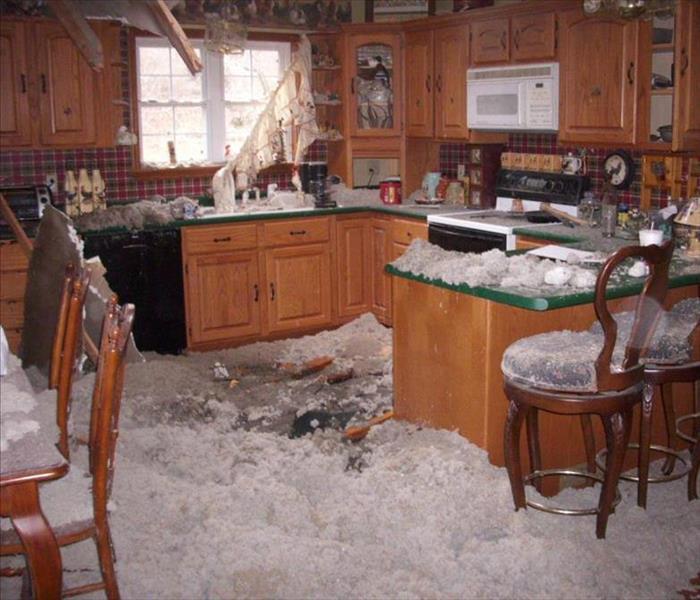 Storm damaged caused by tree
Storm damaged caused by tree
Severe weather can happen anytime, but what can you do to be ready in case disaster strikes?
Build an Emergency Kit. An emergency kit is simply a collection of basic items your household may need in the event of an emergency. You will want to assemble this kit well in advance of an emergency. You may need to evacuate at a moment’s notice and may not have time to search for the supplies you need or shop for them.
You may need to survive on your own after an emergency. This means having your own food, water and other supplies for at least 72 hours. Local officials and relief workers will be on the scene after a disaster but they cannot reach everyone immediately, especially if the disaster is widespread. You may get help in hours or it could take days.
Additionally, basic services such as electricity, gas, water, sewage treatment and telephones may be cut off for days or even a week, or longer. Your supplies kit should contain items to help you manage during these outages.
It is also important to have your insurance information, phone numbers, and other important documents in a secure place so you will have all necessary information you may need in the event of a disaster.
Have an Emergency Communication Plan
Your family may not be together when disaster strikes. It is important to think about the follow and plan just in case.
•How will my family/household get emergency alerts and warnings?
•How will my family/household get to safe locations for relevant emergencies?
•How will my family/household get in touch if cell phone, internet, or landline doesn’t work?
•How will I let loved ones know I am safe?
•How will family/household get to a meeting place after the emergency?
You can visit http://www.ready.gov/make-a-plan for template plans you can download and fill out for your family.
Understand how to receive emergency alerts and warnings. Make sure all household members are able to get alerts about an emergency from local officials. Check with your local emergency management agency to see what is available in your area, and learn more about alerts by visiting: www.ready.gov/alerts.
Before a Storm
•Remove dead or rotting trees and branches that could fall and cause injury or damage during a severe thunderstorm.
•Postpone outdoor activities if there is a storm on the way.
•Secure outdoor objects that could blow away or cause damage.
•Shutter windows and secure outside doors. If shutters are not available, close window blinds, shades or curtains.
•Unplug any electronic equipment well before the storm arrives.
Know the Terms
Familiarize yourself with these terms to help identify a thunderstorm hazard:
Severe Thunderstorm Watch - Tells you when and where severe thunderstorms are likely to occur. Watch the sky and stay tuned to NOAA Weather Radio, commercial radio or television for information.
Severe Thunderstorm Warning - Issued when severe weather has been reported by spotters or indicated by radar. Warnings indicate imminent danger to life and property to those in the path of the storm.
During Thunderstorms and Lightning
If thunderstorm and lightning are occurring in your area, you should:
•Use your battery-operated NOAA Weather Radio for updates from local officials.
•Avoid contact with corded phones and devices including those plugged into electric for recharging. Cordless and wireless phones not connected to wall outlets are OK to use.
•Avoid contact with electrical equipment or cords. Unplug appliances and other electrical items such as computers and turn off air conditioners. Power surges from lightning can cause serious damage.
•Avoid contact with plumbing. Do not wash your hands, do not take a shower, do not wash dishes, and do not do laundry. Plumbing and bathroom fixtures can conduct electricity.
•Stay away from windows and doors, and stay off porches.
•Do not lie on concrete floors and do not lean against concrete walls.
•Avoid natural lightning rods such as a tall, isolated tree in an open area.
•Avoid hilltops, open fields, the beach or a boat on the water.
•Take shelter in a sturdy building. Avoid isolated sheds or other small structures in open areas.
•Avoid contact with anything metal—tractors, farm equipment, motorcycles, golf carts, golf clubs, and bicycles.
Tornadoes
Tornadoes are nature’s most violent storms. Spawned from powerful thunderstorms, tornadoes can cause fatalities and devastate a neighborhood in seconds. A tornado appears as a rotating, funnel-shaped cloud that extends from a thunderstorm to the ground with whirling winds that can reach 300 miles per hour. Damage paths can be in excess of one-mile-wide and 50 miles long. Every state is at some risk from this hazard. Some tornadoes are clearly visible, while rain or nearby low-hanging clouds obscure others. Occasionally, tornadoes develop so rapidly that little, if any, advance warning is possible. Before a tornado hits, the wind may die down and the air may become very still. A cloud of debris can mark the location of a tornado even if a funnel is not visible. Tornadoes generally occur near the trailing edge of a thunderstorm. It is not uncommon to see clear, sunlit skies behind a tornado.
Before a tornado:
•Listen to NOAA Weather Radio or to commercial radio or television newscasts for the latest information. In any emergency, always listen to the instructions given by local emergency management officials.
•Be alert to changing weather conditions. Look for approaching storms.
Look for the following danger signs:
- Dark, often greenish sky
- Large hail
- A large, dark, low-lying cloud (particularly if rotating)
- Loud roar, similar to a freight train.
If you see approaching storms or any of the danger signs, be prepared to take shelter immediately.
Know the Terms
Familiarize yourself with these terms to help identify a tornado hazard:
Tornado Watch - Tornadoes are possible. Remain alert for approaching storms. Watch the sky and stay tuned to NOAA Weather Radio, commercial radio or television for information.
Tornado Warning - A tornado has been sighted or indicated by weather radar. Take shelter immediately.
During a Tornado
If you are under a tornado warning, seek shelter immediately! Most injuries associated with high winds are from flying debris, so remember to protect your head.
Build a Safe Room
Extreme windstorms in many parts of the country pose a serious threat to buildings and their occupants. Your residence may be built "to code" but that does not mean it can withstand winds from extreme events such as tornadoes and major hurricanes. The purpose of a safe room or a wind shelter is to provide a space where you and your family can seek refuge that provides a high level of protection. You can build a safe room in one of several places in your home.
•Your basement
•Atop a concrete slab-on-grade foundation or garage floor.
•An interior room on the first floor.
Safe rooms built below ground level provide the greatest protection, but a safe room built in a first-floor interior room also can provide the necessary protection. Below-ground safe rooms must be designed to avoid accumulating water during the heavy rains that often accompany severe windstorms.
To protect its occupants, a safe room must be built to withstand high winds and flying debris, even if the rest of the residence is severely damaged or destroyed. Consider the following when building a safe room:
•The safe room must be adequately anchored to resist overturning and uplift.
•The walls, ceiling and door of the shelter must withstand wind pressure and resist penetration by windborne objects and falling debris.
•The connections between all parts of the safe room must be strong enough to resist the wind.
•Sections of either interior or exterior residence walls that are used as walls of the safe room must be separated from the structure of the residence so that damage to the residence will not cause damage to the safe room.
After the Storm:
SERVPRO of Franklin County has experience restoring homes affected by storms and flooding. We can respond immediately with highly trained technicians who employ specialized equipment and techniques to restore your home or business back to pre-storm condition.
SERVPRO of Franklin County is located in Union, MO so we are part of this community too. When you have a flooding or storm emergency, we’re already nearby and ready to help. We take pride in being a part of the Franklin County, MO community and want to do our part in making it the best it can be.
We are proud to serve our local communities.
Need Storm or Flood Cleanup Services? Call Us Today (636) 583-5200
Thanksgiving Safety Tips
11/5/2015 (Permalink)
 Thanksgiving Dinner
Thanksgiving Dinner
Did you know that Thanksgiving is the leading day for fires involving cooking equipment, with 3 times the average number?
Here are some tips to help keep your family and home safe this Thanksgiving:
Stay in the kitchen when you are cooking on the stovetop so you can keep an eye on the food.
Stay in the home when cooking your turkey and check on it frequently.
Keep children away from the stove. The stove will be hot and kids should stay 3 feet away.
Make sure kids stay away from hot food and liquids. The steam or splash from vegetables, gravy or coffee could cause serious burns.
Keep the floor clear so you don’t trip over kids, toys, pocketbooks or bags.
Keep knives out of the reach of children.
Be sure electric cords from an electric knife, coffee maker, plate warmer or mixer are not dangling off the counter within easy reach of a child.
Keep matches and utility lighters out of the reach of children — up high in a locked cabinet.
Never leave children alone in room with a lit a candle.
Make sure your smoke alarms are working. Test them by pushing the test button.
Remember, if the unthinkable does happen: We understand you may be feeling confused, stressed, and more than a little vulnerable. Our technicians will treat your family with empathy and your home with great care. Until help arrives, please refer to our Fire Damage Tips—Until Help Arrives Guide and follow these tips to protect yourself and your property.
SERVPRO of Franklin County is locally owned and operated and we are proud to be part of Franklin County, MO. We are also part of a national network of over 1,650 Franchises with special Disaster Recovery Teams placed strategically throughout the country to respond to large-scale fire, water, and storm disasters.
We are proud to serve our local communities:
Have Questions about Fire, Smoke, or Soot Damage?
Call Us Today 24/7 response – (636) 583-5200
Continuing Education Classes
3/27/2015 (Permalink)
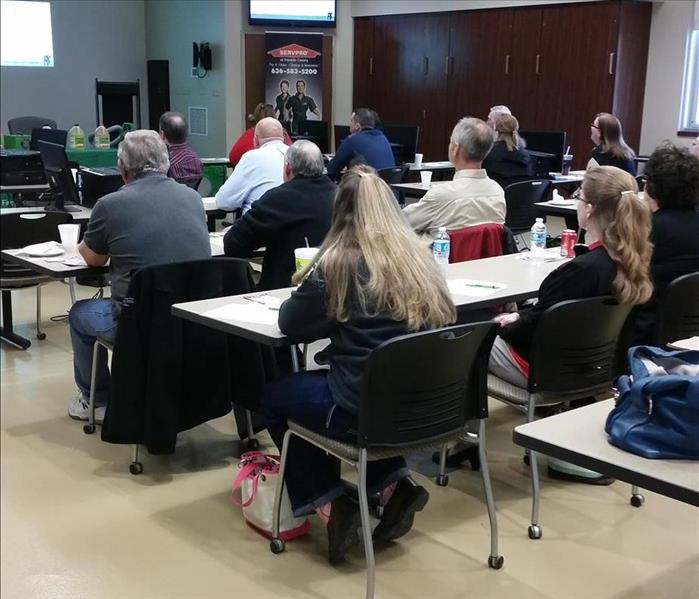 CE class in session
CE class in session
Continuing Education Classes (CE) help you to keep up on the latest industry trends and newest business techniques. They are designed to increase your knowledge and help you improve your business. SERVPRO offers both credit and non-credit courses for insurance agents, insurance adjusters and Real Estate professionals. Our CE courses provide you with information to better service your customers and gain an edge on your competitors.
Typically we offer several CE classes per year. We try to keep the classes light, entertaining and in convenient locations. We know you can take courses on line, but we feel that these classes have some advantages over on line courses. For example you get to get out of the office for a little while, there are a lot of hands on demonstrations that make it easier to learn, there is class interaction and a chance to ask questions and share experiences and maybe best if all they are always free. Normally each class has 20-30 people in attendance and it’s a good opportunity for networking. Hannah and I are both approved instructors by the state and can also do smaller classes upon request. The state does have some strict regulations about scheduling classes, for example a class has to be registered at least 35 days in advance. Also the same class is only good every two years so make sure you check the course number and verify that you haven’t taken the course recently. If you’re thinking about having us do a class for you, we would love to. Just remember we need a little time to register and prepare!
Our most recent class is being held Wednesday March 25th at the new Washington Fire Department Training Center. This is a great venue and we are so excited to partner with the Washington Fire Department for this event. We would love to see you there. Give the office a call to register and we will even buy you your lunch!
Here are some of the CE courses that we offer:
Approved Courses - Insurance
Understanding the Restoration Industry: Property Fire Damage Restoration
Understanding Mold in the Restoration Industry
Understanding Mold in the Restoration Industry - 2hr
Restoring Contaminated Buildings
Restorative Drying for Water Damage - 2hr
Restorative Drying for Water Damage - 4hr
Cleaning & Restoring Smoke-Damaged Contents
Ethics
Approved Courses - Real Estate
Understanding Mold in the Restoration Industry 3
Give us a call if you have any questions about our CE classes and hopefully we will see you on March 25th. Until then, stay Green everybody.


 24/7 Emergency Service
24/7 Emergency Service






















